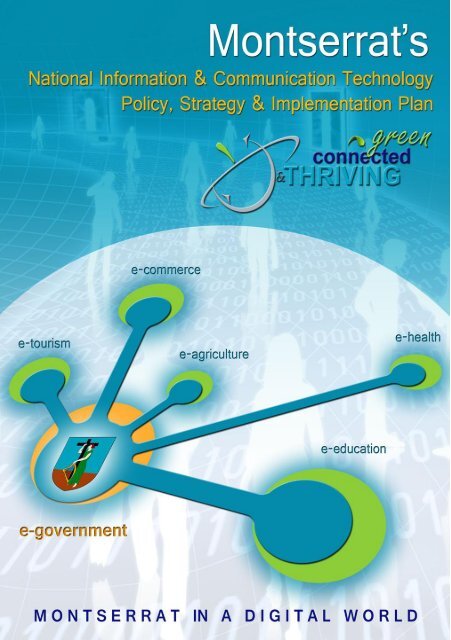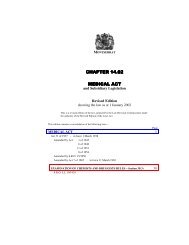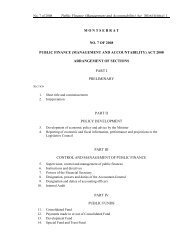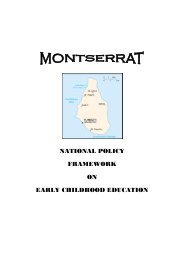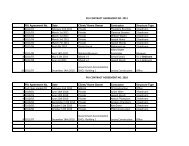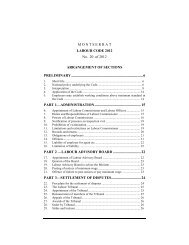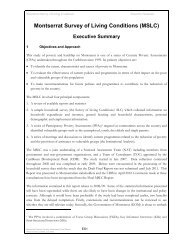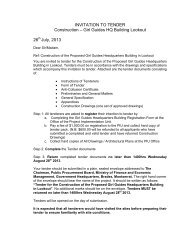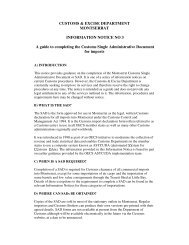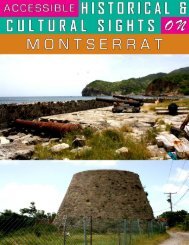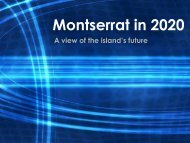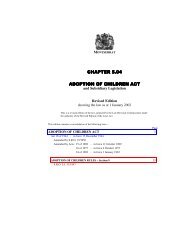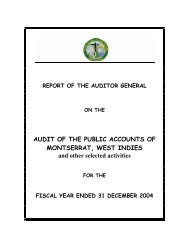Green Connected Thriving - Government of Montserrat
Green Connected Thriving - Government of Montserrat
Green Connected Thriving - Government of Montserrat
- No tags were found...
You also want an ePaper? Increase the reach of your titles
YUMPU automatically turns print PDFs into web optimized ePapers that Google loves.
<strong>Montserrat</strong> ICT Plan - Final Draft (CONFIDENTIAL)
<strong>Green</strong> <strong>Connected</strong><strong>Thriving</strong><strong>Green</strong> Unspoiled, fresh, fertile, lush, environmentally responsible Ample, clean, affordable, renewable energy Productive, sustainable use <strong>of</strong> natural resources Use <strong>of</strong> smart, energy efficient solutions to reduce the environmentalfootprint High value ecotourism built around an unhurried tranquility<strong>Connected</strong>⫘ Integrated, accessible, inclusive, competitive⫘ Robust on-island ICT infrastructure and access⫘ Seamless access to commercial, cultural, educational and health servicesand opportunities anywhere in the world, from home⫘ Virtual <strong>Montserrat</strong> with active involvement <strong>of</strong> the Diaspora<strong>Thriving</strong>↺ Economic regeneration, enterprising population, expanding markets,flourishing sectors↺↺ Limitless possibilities1 The essence <strong>of</strong> the National ICT Vision is that <strong>Montserrat</strong> is its natural self - a lush, green, tranquil,unspoiled, nature island, which is fully connected to the world with all the opportunities andconveniences that it presents. It is a place where residents are thriving, leading rich and fulfillinglives on their own terms and in harmony with the environment.<strong>Montserrat</strong> ICT Plan - Final Draft (CONFIDENTIAL)
List <strong>of</strong> Abbreviations4GB2BB2CBOMBPRCANTOCARICADCARICOMCDBCCCccTLDCFTCIGFCIDCSIRTCSMECTUDITESDMCAECTELEGRIPEIUEMISEUGDPGIUGOMGPRHIPCARHRICT(s)ISPITECITUIXPLIME4 th GenerationBusiness-to-BusinessBusiness-to-ConsumerBank <strong>of</strong> <strong>Montserrat</strong>Business Process ReengineeringCaribbean Association <strong>of</strong> National TelecommunicationsOrganisationsCaribbean Center for Development AdministrationCaribbean CommunityCaribbean Development BankCaribbean Cable Communications (Inc.)Country Code Top Level DomainComputers for Teachers initiativeCaribbean Internet Governance ForumCenter for International Development at Harvard UniversityComputer Security Incident Response TeamCaribbean Single Market and EconomyCaribbean Telecommunications UnionDepartment <strong>of</strong> Information Technology and e-<strong>Government</strong> ServicesDisaster Management Coordination AgencyEastern Caribbean Telecommunications AuthorityElectronic <strong>Government</strong> for Regional Integration ProjectEconomist Intelligence UnitEnvironment, Learning, Access, Virtual and AdoptionEducation Management Information SystemEuropean UnionGross Domestic Product<strong>Government</strong> Information Unit<strong>Government</strong> <strong>of</strong> <strong>Montserrat</strong><strong>Government</strong> Process ReengineeringHarmonisation <strong>of</strong> ICT Policies, Legislation and Regulation in theCaribbean ProjectHuman ResourcesInformation and Communications Technology(ies)Internet Service ProviderIndian Technical and Economic CooperationInternational Telecommunication UnionInternet Exchange PointLandline, Internet, Mobile & Entertainment<strong>Montserrat</strong> ICT Plan - Final Draft (CONFIDENTIAL)1
MCCMCRSMCWLMDCMDG(s)MICAMOUMSME(s)MULMVONGO(s)NHSOCMOECSOSILACPPP(s)PTVRBCROISBA<strong>Montserrat</strong> Community College<strong>Montserrat</strong> Customs and Revenue ServicesMinistry <strong>of</strong> Communications, Works and Labour<strong>Montserrat</strong> Development CorporationMillennium Development Goal(s)<strong>Montserrat</strong> Info-Communications AuthorityMemorandum <strong>of</strong> UnderstandingMicro, Small and Medium Sized Enterprise(s)<strong>Montserrat</strong> Utilities Limited<strong>Montserrat</strong> Volcano ObservatoryNon-<strong>Government</strong>al Organisation(s)National Health SystemOne Caribbean Media GroupOrganisation <strong>of</strong> Eastern Caribbean StatesObservatory for the Information Society in Latin America and theCaribbeanPublic/Private Partnership(s)People’s TVRoyal Bank <strong>of</strong> CanadaReturn on InvestmentSmall Business AssociationSDP Sustainable Development Plan 2008 – 2020TIPA Trade and Investment Promotion AgencyUN-ECLAC United Nations Economic Commission for Latin America and theCaribbeanUSF Universal Service FundUWI University <strong>of</strong> the West IndiesWEF GITR World Economic Forum, Global Information Technology ReportWSIS World Summit on the Information Society<strong>Montserrat</strong> ICT Plan - Final Draft (CONFIDENTIAL)2
<strong>Montserrat</strong> ICT Plan - Final Draft (CONFIDENTIAL)4
<strong>Montserrat</strong> ICT Plan - Final Draft (CONFIDENTIAL)8
1 Introduction<strong>Montserrat</strong>, an Overseas Territory <strong>of</strong> the United Kingdom, is an island with acurrent population <strong>of</strong> approximately 5,000 persons and a total land area <strong>of</strong> about102 km 2 . Since 1995, <strong>Montserrat</strong> has been severely and adversely impacted by itsSoufriere Hills Volcano, which has been erupting continuously at varying levels <strong>of</strong>intensity, ending for the time being all human habitation <strong>of</strong> the central andsouthern parts <strong>of</strong> the island. Plymouth, once the main town and capital, wasdestroyed by the eruptions, and with it most <strong>of</strong> the island’s housing stock, primarypublic infrastructure and socio-economic activity. The remaining inhabitants, whoconstitute about 40% <strong>of</strong> the pre-1995 population, are confined to living in thenorth <strong>of</strong> the island.Notwithstanding the ongoing challenges, <strong>Government</strong> has been moving diligentlyand resolutely to restore quality <strong>of</strong> life, regenerate the economy, and ultimatelycreate “” as articulated our SustainableDevelopment Plan (SDP) 2008 – 2020. In response to the SDP, a number <strong>of</strong>subsidiary companion plans have been created, including an EducationDevelopment Plan and an e-<strong>Government</strong> Strategy.This National ICT Policy, Strategy and Implementation Plan, collectively called theNational ICT Plan, is also a companion plan to the SDP, bringing an overarchingnational perspective on the role <strong>of</strong> ICT in achieving our SDP’s goals. It is based onconsultations with a wide cross section <strong>of</strong> <strong>Montserrat</strong>ian society between October2011 and December 2011 including <strong>Government</strong> ministries, private sectorstakeholders, youths at the secondary school and community college, the generalpublic and the Diaspora. The Plan has also been developed from the results <strong>of</strong>research conducted on international ICT imperatives, <strong>Montserrat</strong>’s nationalpriorities and the findings <strong>of</strong> a current state assessment.The process <strong>of</strong> wide collaboration, research and reflection to determine a wayforward for the population has produced a National ICT Plan that is typically<strong>Montserrat</strong>ian and can be readily embraced as our own. It should thereforegenerate a degree <strong>of</strong> excitement, anticipation and a commitment to action among<strong>Montserrat</strong>ians at home and abroad, guided by the National ICT Vision:<strong>Green</strong> <strong>Connected</strong><strong>Thriving</strong><strong>Montserrat</strong> ICT Plan - Final Draft (CONFIDENTIAL)9
2 International ICT Initiatives and National PrioritiesThe <strong>Government</strong> <strong>of</strong> <strong>Montserrat</strong> is aware <strong>of</strong> a number <strong>of</strong> international and regionalinitiatives designed to foster the adoption <strong>of</strong> ICTs for development. Foremost <strong>of</strong>these are a number <strong>of</strong> initiatives being driven by the United Nations (UN),including the World Summit on the Information Society (WSIS), the MillenniumDevelopment Goals (MDGs) targeted for achievement by 2015, and eLAC2015,which emphasises ICTs as tools for economic development and social inclusion.The UN has also made a recent call for all countries to have a national broadbandpolicy by 2015.In the Caribbean, CARICOM has developed an e-<strong>Government</strong> Strategy and aRegional Digital Development Strategy which focus on using ICT to advance theCommunity goals <strong>of</strong> functional cooperation and economic integration. Moreinformation on these and other relevant, regional initiatives <strong>of</strong> the InternationalTelecommunication Union (ITU) and Caribbean Telecommunication Union (CTU)is provided in Appendix A.Each <strong>of</strong> these initiatives has benefited from wide consultation and lessons learnedfrom various regions and countries that have similarly identified ICT as a majorcatalyst for transforming and sustaining their economies. To the credit <strong>of</strong> thosecountries, significant progress has already been made through coordinated effortsto document, analyse and act on their findings. In creating <strong>Montserrat</strong>’s NationalICT Plan, a number <strong>of</strong> these lessons which were found to be relevant to our localcircumstances were therefore taken into account in the formulation <strong>of</strong> the Plan.Notably, our SDP has already established several national priorities, for which thisNational ICT Plan must serve as supporter, enabler and accelerator. The SDPclearly articulates the following vision for <strong>Montserrat</strong> to be achieved by the year2020:The SDP identifies five strategic goals - Economic Management; HumanDevelopment; Environmental Management and Disaster Mitigation; Governance; andPopulation - for driving national development as illustrated below:<strong>Montserrat</strong> ICT Plan - Final Draft (CONFIDENTIAL)10
Each <strong>of</strong> the five strategic goals is expanded into a set <strong>of</strong> objectives, both long-termand medium-term, with accompanying strategies. The National ICT Plan has beendesigned to support, enable and accelerate the achievement <strong>of</strong> the SDP goalsillustrated in the diagram below.<strong>Montserrat</strong> ICT Plan - Final Draft (CONFIDENTIAL)11
3 Current State Assessment3.1 Current State <strong>of</strong> ICT in <strong>Montserrat</strong>The Current State Assessment provides relevant information on thetelecommunications service providers operating in <strong>Montserrat</strong>; the various ICTpenetration levels for the population; the state <strong>of</strong> telecommunicationsinfrastructure and services; the governance framework; and the communicationssector’s contribution to national GDP. The Assessment also outlines the keychallenges facing <strong>Montserrat</strong> as well as a number <strong>of</strong> opportunities.3.1.1 Service Providers<strong>Montserrat</strong> has two major facilities-based suppliers <strong>of</strong> telecommunicationsservices who are the sole providers in their respective areas <strong>of</strong> service provision:LIME 2 for fixed and mobile telephony, and Internet services; andCaribbean Cable Communications (CCC) for cable TV services.Other significant service providers or operators in the ICT space in <strong>Montserrat</strong>include:People’s TV (PTV), which operates the only free-to-air TV service in<strong>Montserrat</strong>. PTV broadcasts 24 hours/day on channel 7 with an estimated70% coverage <strong>of</strong> the population, 40% viewership and 67% foreign content.Streaming on demand is available at www.ptvmontserrat.com;<strong>Government</strong> Information Unit, which operates ZJB Radio <strong>Montserrat</strong> on88.3 and 95.5 FM. ZJB is also streamed live on Spirit <strong>of</strong> <strong>Montserrat</strong> Online atzjb.gov.ms;Caribbean Superstation 93.9 FM, a multi-country station <strong>of</strong> the OneCaribbean Media (OCM) Group, operated from Trinidad;Eternal Life Radio and Family Radio, which are free-to-air and online radiostations; MNI Networks Ltd, which manages and administers the operations <strong>of</strong> the.ms ccTLD (<strong>Montserrat</strong>’s country code top-level domain); MNI NetworksLtd runs an automated registry with over 5,000 domain names; andMultiple new media groups with online presence catering to the socialmedia users and the <strong>Montserrat</strong>ian Diaspora, including:o mnialive.como mymontserrat.como montserratculture.como lavabits.com2 LIME, an acronym for 'Landline, Internet, Mobile, Entertainment', is a communications providerowned by Cable & Wireless.<strong>Montserrat</strong> ICT Plan - Final Draft (CONFIDENTIAL)12
3.1.2 Telecommunications Penetration<strong>Montserrat</strong> is reasonably well served by communications services. The table belowpresents <strong>of</strong>ficial ICT utilisation statistics obtained from the <strong>Montserrat</strong> Info-Communications Authority (MICA) except for the cable TV statistics, which weresupplied by the service provider, Caribbean Cable Communications (CCC).Comparative service penetration averages for the ECTEL 3 states are also provided.ItemTable 1: Comparative ICT Utilisation StatisticsSubscribers(2011)MONTSERRAT% Penetration(Households)% Penetration(Population)ECTEL States(2010)% Penetration(Population)Population 5000Households 2700Fixed Line Telephone 2600 96.3% 52% 26.5%Broadband Internet** 1200 44.4% 24% 15%Mobile - Prepaid 2800126% 68% 129%Mobile - Post-paid 600Cable TV 1144 42.4% 22.9%** Broadband Internet is defined as 1 Mbps or more in this context3.1.3 International ConnectivityLIME operates <strong>Montserrat</strong>’s only international terrestrial telecommunications link.All international services are transported via a single broadband microwavesystem between LIME’s premises at Sweeney’s and Antigua. In the past, LIMEoperated a subsea fibre system and cable landing station providing internationalconnectivity. However, these were destroyed by the volcano. Proposals have beenmade for the establishment <strong>of</strong> a new cable and cable landing facility, but these areyet to be realised.3.1.4 Domestic Telecommunications Infrastructure and ServicesTelephone service infrastructure is available throughout the inhabited areas <strong>of</strong><strong>Montserrat</strong>, typically via underground and aerial copper cable. A notable exceptionis the major new residential area, Lookout, which is served via (narrowband) loopwireless distribution methods purportedly owing to prohibitively high costs <strong>of</strong>installing cable infrastructure. This situation constrains delivery <strong>of</strong> broadbandservices in this important service area. There is also limited use <strong>of</strong> optical fibretransmission for domestic telecommunications transport in <strong>Montserrat</strong>.LIME <strong>of</strong>fers the standard range <strong>of</strong> fixed and mobile telephone andtelecommunications services in <strong>Montserrat</strong>. The company is moving to upgrade its3 The Eastern Caribbean Telecommunications Authority (ECTEL) Member States are Dominica,Grenada, St. Kitts and Nevis, Saint Lucia and St. Vincent and the Grenadines. Data was sourced fromECTEL’s Annual Electronic Communications Sector Review 2009 – 2010.<strong>Montserrat</strong> ICT Plan - Final Draft (CONFIDENTIAL)13
technology to match <strong>of</strong>ferings in the other Caribbean countries in which itoperates, consistent with the advertised LIME vision <strong>of</strong> “One Caribbean”. LIME hasindicated its plans to make Fourth generation (4G) mobile services, IPTV andmobile TV available in 2013. The company currently defines broadband servicesas being 1 Mbps download or higher and, at present, residential services up to 3Mbps and corporate services up to 6 Mbps are <strong>of</strong>fered. Such bandwidth is,however, available only via fixed line connections as mobile service is only secondgeneration GSM with GPRS / Edge, typically delivering limited data speeds in theorder <strong>of</strong> 128 kbps.CCC <strong>of</strong>fers analogue cable TV services via coaxial cable throughout most <strong>of</strong><strong>Montserrat</strong>. However, the Lookout area is only partially served, purportedly onaccount <strong>of</strong> high cable installation costs. CCC also operates cable TV services in theneighboring islands <strong>of</strong> Nevis and Anguilla. CCC has been operating in the<strong>Montserrat</strong> market for about 25 years and has indicated a desire to modernise andexpand its services in <strong>Montserrat</strong> to also <strong>of</strong>fer digital TV, including high definitionprogramming and Internet access. The business case for implementation <strong>of</strong> theseplans is, however, still being developed in the context <strong>of</strong> <strong>Montserrat</strong>’s small marketsize and new regulatory framework.3.1.5 GovernanceThe Ministry <strong>of</strong> Communications, Works and Labour is responsible for ICT and ICTpolicy formulation in <strong>Montserrat</strong>, with the <strong>Montserrat</strong> Info-CommunicationsAuthority (MICA) established as the independent regulator.The passage <strong>of</strong> the Info-communications Act (No. 4 <strong>of</strong> 2009), the establishment <strong>of</strong>MICA pursuant to the Act, and the recent proclamation <strong>of</strong> appropriate Regulationshave opened up the market for ICT services in <strong>Montserrat</strong>. However, no newnetwork or service provider concessions or licenses have yet been awarded,although MICA has reported that various proposals for new or enhanced serviceprovision are engaging their attention. Existing service providers are following theprocedures required to continue operating under the new legislation andregulations. MICA also has oversight <strong>of</strong> <strong>Montserrat</strong>’s country code Top LevelDomain (ccTLD) “.ms”, consistent with its responsibility for the regulation <strong>of</strong>Internet services.3.1.6 Economic Sector ContributionAvailable statistics for 2009 indicate that the Communications sector contributedEC$7.62M or 5.33% <strong>of</strong> national GDP, an increase <strong>of</strong> 1.44% over the previous year.However, in 2008 the sector had contracted by 12.94%. Information receivedfrom the service providers indicates that the subscriber base for certain traditionalservices is flat or declining (e.g. landline, cable TV) reducing the likelihood <strong>of</strong>robust sector growth since 2009.3.1.7 Key Challenges<strong>Montserrat</strong>’s small market size is repeatedly cited as a key challenge to businessenterprise and investment. In the ICT sphere, both LIME and CCC, the major<strong>Montserrat</strong> ICT Plan - Final Draft (CONFIDENTIAL)14
facilities-based carriers, reported return on investment (ROI) shortcomings intheir plans for service or infrastructure enhancements and are seeking appropriatesolutions in order to proceed. The market size is also a significant constraint to theentry <strong>of</strong> additional service providers, the creation <strong>of</strong> new businesses, and thereforea more competitive business environment.ICT may be used as a tool to help enhance business prospects by expanding thetarget market to include neighbouring islands, the <strong>Montserrat</strong>ian Diaspora and therest <strong>of</strong> the world. However, for facilities-based developments, access to capital on aconcessionary basis, possibly through a public/private partnership may berequired. Given our recurrent budget deficits at present, however, the extent towhich <strong>Government</strong> may be able to facilitate financing is unclear.Financing options are limited in <strong>Montserrat</strong>. The two commercial banks, Bank <strong>of</strong><strong>Montserrat</strong> and Royal Bank <strong>of</strong> Canada, have been relatively conservative in theiroperations and are also resource constrained by virtue <strong>of</strong> the size <strong>of</strong> the market.People’s TV has also highlighted the impact <strong>of</strong> the lack <strong>of</strong> venture capital on itsservice enhancement plans. Credit cards are accepted by several merchants, butnot at <strong>Government</strong> <strong>of</strong>fices at this time, and there are no debit card point-<strong>of</strong>-saleservices, owing in part to a combination <strong>of</strong> low merchant interest and lowcustomer demand. E-Commerce growth is also limited by the absence <strong>of</strong> localmerchant account facilities.Other non-financial challenges that are fundamental and significant include: The shortcomings <strong>of</strong> basic infrastructure to support business and trade,such as air and sea access to <strong>Montserrat</strong>; The need for more consistent and reliable electrical power; The small pool <strong>of</strong> private sector ICT expertise; An education curriculum that is not sufficiently focused on ICT andentrepreneurship; The lack <strong>of</strong> island-wide broadband services; The lack <strong>of</strong> high speed wireless access; and The limitations <strong>of</strong> international broadband connectivity (i.e. lack <strong>of</strong>alternatives such subsea fibre or satellite).3.1.8 Opportunities<strong>Montserrat</strong>’s current population <strong>of</strong> 5,000, its geographic size and small, occupiedland area present a number <strong>of</strong> exciting opportunities. The country has the abilityto leapfrog, through rapid implementation and development, to be a totallyconnected and sophisticated ICT society that could be a model for the region. Thenational priorities <strong>of</strong> improved healthcare, enhanced education, responsive socialservices and a model, progressive <strong>Government</strong>, as captured in the e-<strong>Government</strong>Strategy, can be achieved. Indeed, <strong>Montserrat</strong> has the unique opportunity <strong>of</strong>realising our vision <strong>of</strong> being <strong>Green</strong> <strong>Connected</strong> <strong>Thriving</strong>.<strong>Montserrat</strong> ICT Plan - Final Draft (CONFIDENTIAL)15
3.2 <strong>Montserrat</strong>’s e-ReadinessAn ‘e-Ready’ society 4 can be described as one that has the necessary physical ICTinfrastructure; has incorporated ICTs throughout <strong>Government</strong>, businesses,communities and in everyday life; has strong telecommunications competition andindependent regulation with a commitment to universal access; and has no limitsto ICT trade or foreign investment.Using the e-Readiness Assessment framework developed by the Center forInternational Development (CID) at Harvard University, <strong>Montserrat</strong>’s e-Readinesswas examined in 19 categories, ranking each by its level <strong>of</strong> advancement,represented by stages 1 through 4 (1 being the lowest and 4 being the highest).The results <strong>of</strong>fered broad insights for our planning efforts. Based on the individualcategory rankings for each <strong>of</strong> the 19 categories, it is clear that there are a number<strong>of</strong> gaps that need to be addressed if <strong>Montserrat</strong> is to become an e-Ready society.This is illustrated in the diagram below.Details <strong>of</strong> the assessment are included in Appendix B.4 Refers to the definition <strong>of</strong> an e-Ready society taken from the Center for International Development(CID) at Harvard University.<strong>Montserrat</strong> ICT Plan - Final Draft (CONFIDENTIAL)16
3.3 Reference Countries<strong>Montserrat</strong>, for several reasons, is not currently included in any <strong>of</strong> the moreestablished international and regional ICT-type studies. This precludes <strong>Montserrat</strong>from being compared with similar countries in the various rankings. Accordingly,the primary purpose <strong>of</strong> the review <strong>of</strong> reference countries was to identify andclosely examine their ICT plans and strategies to help inform the creation <strong>of</strong> ourown National ICT Policy and Strategy.Several reference countries were identified and their respective ICT plans and/orstrategies reviewed in detail. The countries were chosen based on the followingconsiderations, as applicable: Ease <strong>of</strong> access to publicly available information on the country’s ICT plansand progress; Incorporation <strong>of</strong> the country in major international/regional ICT surveys; Focus on the development <strong>of</strong> ICT as a sector and significant contributor tonational GDP; Being a country recognised as a leader internationally/regionally in its use<strong>of</strong> ICT for development and economic growth ; Geographic proximity to <strong>Montserrat</strong>; and/or Existing or potential strategic relationship with the <strong>Government</strong> <strong>of</strong><strong>Montserrat</strong>.The list <strong>of</strong> reference countries and a summary view <strong>of</strong> the countries and theirrankings is provided in the table below:<strong>Montserrat</strong> ICT Plan - Final Draft (CONFIDENTIAL)17
Additionally, the case studies and experiences <strong>of</strong> these countries, as captured inthe various ICT survey reports, provide useful insights for any country seeking todetermine “current best thinking”.A number <strong>of</strong> international ICT surveys were also studied, including the following:• The Global Information Technology Report 2010-2011, World EconomicForum;• Information and Communication Technology Maturity: Determining accessand use <strong>of</strong> ICT infrastructures to build capabilities for Development (2011),Sadja Qureshi;• Digital Economy Rankings 2010 – Beyond e-Readiness, Economist IntelligenceUnit; and• Global e-<strong>Government</strong> Survey 2010, United Nations.<strong>Montserrat</strong> ICT Plan - Final Draft (CONFIDENTIAL)18
4 National ICT VisionOur <strong>Montserrat</strong> Sustainable Development Plan (SDP) presented a compellingvision to be “” by the year 2020. Amongthe many priorities and activities identified is a clear recognition <strong>of</strong> the critical rolethat Information and Communications Technology (ICT) must play. For<strong>Montserrat</strong>ians everywhere, ICT presents numerous opportunities to enhancealmost every aspect <strong>of</strong> their lives, with significant benefits to be gained. ICT alsoserves as a foundation upon which future generations <strong>of</strong> <strong>Montserrat</strong>ians canthrive.Having taken account <strong>of</strong> the current state <strong>of</strong> ICT in <strong>Montserrat</strong>; regional andinternational trends in the sector; and following extensive consultations (withpersons in <strong>Government</strong>, the business community, the ICT sector, the secondaryand tertiary student body, the general public and the Diaspora), <strong>Government</strong> hasformulated a statement <strong>of</strong> vision for ICT development which is consistent with andsupportive <strong>of</strong> the goals <strong>of</strong> the SDP. The following National ICT Vision embodies, inone compelling statement, the aspirations, hopes and concerns expressed by thepopulation:<strong>Green</strong> <strong>Connected</strong><strong>Thriving</strong>Visually, the National ICT Vision is depicted by the following unique image, whichcontains elements <strong>of</strong> a globe with subtle representation <strong>of</strong> the universal symbol forthe “power” button used for electronic equipment. The image also suggestsmovement and progress through the arrows encircling the globe, while at the sametime maintaining a green, environmentally sensitive focus.<strong>Montserrat</strong> ICT Plan - Final Draft (CONFIDENTIAL)19
The National ICT Vision has the following connotations:<strong>Green</strong> Unspoiled, fresh, fertile, lush, environmentally responsible Ample, clean, affordable, renewable energy Productive, sustainable use <strong>of</strong> natural resources Use <strong>of</strong> smart, energy efficient solutions to reduce the environmentalfootprint High value ecotourism built around an unhurried tranquility<strong>Connected</strong>⫘ Integrated, accessible, inclusive, competitive⫘ Robust on-island ICT infrastructure and access⫘ Seamless access to commercial, cultural, educational and health servicesand opportunities anywhere in the world, from home⫘ Virtual <strong>Montserrat</strong> with active involvement <strong>of</strong> the Diaspora<strong>Thriving</strong>↺ Economic regeneration, enterprising population, expanding markets,flourishing sectors↺↺ Limitless possibilities<strong>Montserrat</strong> ICT Plan - Final Draft (CONFIDENTIAL)20
5 National ICT Policy<strong>Montserrat</strong> is progressing on its journey <strong>of</strong> redeveloping and sustaining itself. Thepeople <strong>of</strong> <strong>Montserrat</strong> are proud <strong>of</strong> their history and culture, something that theycelebrate keenly and respect reverently. There is broad recognition andagreement that ICTs, once effectively introduced, managed and evaluatedcontinuously, can enhance the wellbeing <strong>of</strong> <strong>Montserrat</strong>’s population and economy.Similar views are held by many developed and developing societies around theworld that are increasingly using ICTs to achieve their collective goals morerapidly. There is an emerging notion <strong>of</strong> access to ICTs as a basic human right, withsome countries taking it to the point <strong>of</strong> having it enshrined in law. Suchinternational efforts to bring the benefits <strong>of</strong> ICTs to all individuals serve tounderscore the importance <strong>of</strong> the existing digital landscape and its relevance tosocial and economic sustainability, and even prosperity.The <strong>Government</strong> recognises the increasingly pervasive presence and potential <strong>of</strong>ICTs to impact all aspects <strong>of</strong> modern life and particularly their pr<strong>of</strong>ound influenceon economic competitiveness. There are clear opportunities for appropriate andinnovative use <strong>of</strong> ICTs to enable <strong>Montserrat</strong> to overcome the challenges <strong>of</strong> oureconomic deficits, small size and geography in achieving sustainable development.Further, ICTs can provide a platform for engaging citizens and the Diaspora formore effective, inclusive and transparent governance.In parallel, <strong>Government</strong> is continuing with efforts to determine the mostappropriate solution for renewable energy to power the country’s growth anddevelopment. The focus on education is captured in “The <strong>Montserrat</strong> Learner for2020” which calls for a significant emphasis on ICT-facilitated learning and ICTliteracy, collectively referred to as e-Education. The e-<strong>Government</strong> Strategy seeksto position our public service as “a model <strong>of</strong> good governance” in our efforts tobecome more efficient, effective, responsive and accountable. There have beennumerous public references and calls to support electronic payments, or e-Payments. Similar calls have been made for using ICTs for enhanced healthcare, ore-Health.The opportunity therefore exists to create a single “thread” that guides thedevelopment <strong>of</strong> future plans and influences the implementation <strong>of</strong> existing plans,from the perspective <strong>of</strong> ICTs. The National ICT Policy will be that “thread” and isarticulated by the Policy objectives that follow.National ICT Policy ObjectivesThe <strong>Government</strong> has set out to encourage, favour and promote the identification,development, adoption and utilisation <strong>of</strong> ICTs, as appropriate, in order to advancethe achievement <strong>of</strong> the national strategic goals. This position is more specificallyinformed by the National ICT Policy’s focus in the areas <strong>of</strong> Access, Learning,Society, Economy and Policy. These areas are generally internationally regardedas the basic tenets <strong>of</strong> using ICTs for national development and transformation.<strong>Montserrat</strong> ICT Plan - Final Draft (CONFIDENTIAL)21
In order to create a powerful concept that is uniquely <strong>Montserrat</strong>ian and which canbe used to quickly communicate the Policy’s focus areas, <strong>Government</strong> hasdeveloped the acronym . As an acronym, follows the establishedpattern <strong>of</strong> incorporating an “e” as a prefix, as in the cases <strong>of</strong> e-business, e-government and e-health where the “e” suggests the effective application <strong>of</strong> ICTs inbusiness, government and health respectively. The five focus areas depicted byare Environment, Learning, Access, Virtual and Adoption.also connotes the fluid nature <strong>of</strong> ICTsand the rapid pace <strong>of</strong> technological change.Like volcanic lava, once hardened or solidified,the outcomes <strong>of</strong> the Policy’s five focus areaswill indeed change <strong>Montserrat</strong>’s socioeconomiclandscape and claim new territory inthe digital world. Also, the way in which ICTmanifests itself (in terms <strong>of</strong> its structure andconstitution) will differ by person, communityand sector.<strong>Government</strong> also designed the following logo for , which will also be usedwhen communicating the National ICT Policy’s five focus areas to the public. Itportrays the fusion <strong>of</strong> ICTs and the intimate relationship that exists between thepeople <strong>of</strong> <strong>Montserrat</strong> and the iconic Soufriere Hills Volcano. The logo’s coloursreflect the energy and severity <strong>of</strong> the volcano, while at the same time depicting thetransformational nature <strong>of</strong> lava as it begins to cool and solidify.A distinct policy objective has been developed for each focus area in –Environment, Learning, Access, Virtual and Adoption – based on a distillation <strong>of</strong> ournational priorities, the National ICT Vision and “current best thinking”. This hasresulted in the National ICT Policy objectives presented in the sub-sections thatfollow.<strong>Montserrat</strong> ICT Plan - Final Draft (CONFIDENTIAL)22
5.1 EnvironmentNatural • Policy • LegalTo ensure the existence <strong>of</strong> an enabling legal and regulatory environmentthat promotes ICT-facilitated activities and development in a secure,ethical, environmentally sensitive and economically sustainable way.The following points highlight the different dimensions <strong>of</strong> the policyobjective for the “Environment” focus area, and provide deeper insight intothe Policy’s desired outcomes:i. Establish an environment that will encourage local enterprise andattract foreign direct investment in ICTs;ii.iii.iv.Establish a legal framework that protects the privacy <strong>of</strong> sensitive andpersonal information and data;Establish a security framework to allow widespread use <strong>of</strong> ICT inevery sphere <strong>of</strong> endeavor;Ensure the existence <strong>of</strong> “green” policies for the use <strong>of</strong> ICTs that willpreserve and protect the environment;v. Establish the necessary policy mechanisms to treat with the disposal<strong>of</strong> electronic equipment in an environmentally responsible way; andvi.Ensure that the necessary skills and systems are in place to supporteffective implementation and enforcement <strong>of</strong> ICT-related laws andregulations.5.2 LearningEducation • Literacy • DevelopmentTo enhance the capacity and propensity <strong>of</strong>, as well as opportunities for,the population to effectively and innovatively create and use ICT tools foreducation, business, social, cultural and leisure purposes.The following points serve to highlight the different dimensions <strong>of</strong> the policyobjective for the “Learning” focus area, and provide deeper insight into thePolicy’s desired outcomes:i. Use ICTs to improve the management and delivery <strong>of</strong> educationservices, and enhance the learning experience and outcomesthroughout the education system;ii.iii.iv.Build an ICT literate and e-Ready population with the skills andattitudes to use ICT to enhance their daily lives;Develop the skills required for <strong>Montserrat</strong>’s local ICT service sector;andFacilitate the necessary training and development interventions toallow for the creation <strong>of</strong> world-class ICT applications and solutionslocally.<strong>Montserrat</strong> ICT Plan - Final Draft (CONFIDENTIAL)23
5.3 AccessInfrastructure • ConnectivityTo enable universal, open, affordable, wired and wireless access to highcapacity, high availability, national and international broadbandinfrastructure, technology and services.The following points serve to highlight the different dimensions <strong>of</strong> the policyobjective for the “Access” focus area, and provide deeper insight into thePolicy’s desired outcomes:i. <strong>Government</strong> will take all necessary actions to ensure that theinfrastructure needed to realise its strategy is put in place, especiallywhere commercial operators are not prepared to make theassociated infrastructure investments;ii.iii.iv.<strong>Montserrat</strong> will establish and maintain high-bandwidth, highlyreliable, affordable, domestic and international connectivity (i.e.island-wide access within <strong>Montserrat</strong> as well as access into and out<strong>of</strong> <strong>Montserrat</strong>) with island-wide access to broadband capacity <strong>of</strong> atleast 5Mbps for all by the year 2016;Explore the benefits <strong>of</strong> cloud computing to reduce capital costs andincrease service reliability; andRemove or reduce duties and taxation on all ICT equipment(hardware and s<strong>of</strong>tware) imported into <strong>Montserrat</strong>.5.4 VirtualSociety • Community • CultureTo promote the use <strong>of</strong> ICT tools for establishing and supporting physicaland virtual communities and interests groups to preserve and enhance<strong>Montserrat</strong>ian cultural identity and values amongst the residentpopulation as well as the Diaspora.The following points serve to highlight the different dimensions <strong>of</strong> the policyobjective for the “Virtual” focus area, and provide deeper insight into thePolicy’s desired outcomes:i. Enhance the engagement and participation <strong>of</strong> residents and theDiaspora in <strong>Montserrat</strong>’s socio-economic development andgovernance;ii.iii.Promote the use <strong>of</strong> ICT in establishing virtual communities <strong>of</strong>interest in areas such as agriculture, tourism, fishing andvolcanology; andIncrease the global visibility and viability <strong>of</strong> <strong>Montserrat</strong> based on itsvirtual population (combined strength and size <strong>of</strong> its on-island and<strong>of</strong>f-island population).<strong>Montserrat</strong> ICT Plan - Final Draft (CONFIDENTIAL)24
5.5 Adoption<strong>Government</strong> • BusinessesTo promote the early adoption and effective use <strong>of</strong> ICT by governmentand businesses for greater internal and external communication, as wellas for greater efficiency, visibility, availability and performance.The following points serve to highlight the different dimensions <strong>of</strong> the policyobjective for the “Virtual” focus area, and provide deeper insight into thePolicy’s desired outcomes:i. Support the growth and competitiveness <strong>of</strong> economic activitythrough innovative and effective use <strong>of</strong> ICT;ii.iii.iv.Develop the indigenous capacity to innovate, create, commercialiseand manage the ICT solutions that <strong>Montserrat</strong> needs;Optimise the efficiency and effectiveness <strong>of</strong> service delivery andbusiness processes in the public sector;Use ICT to transform the public sector for greater transparency,accountability and accessibility;v. <strong>Government</strong> to function as an early adopter <strong>of</strong> effective ICTsolutions;vi.vii.viii.Use ICTs to assist in disaster mitigation and management;Keep citizens aware <strong>of</strong> public policies, decisions and other relevant<strong>Government</strong> information on an ongoing basis; andEncourage the development and implementation <strong>of</strong> “shared”systems guided by a principle <strong>of</strong> “build once, use <strong>of</strong>ten”.<strong>Montserrat</strong> ICT Plan - Final Draft (CONFIDENTIAL)25
6 National ICT StrategyBuilding on the ICT Policy’s focus areas, as captured by , the National ICTStrategy sets out a context for the realisation <strong>of</strong> the National ICT Vision andachievement <strong>of</strong> the National ICT Policy objectives. The Strategy comprises anumber <strong>of</strong> strategic thrusts, which will be pursued through a series <strong>of</strong> relatedprogrammes and projects. These relationships are illustrated in the diagrambelow:ICT PolicyFocusAreasStrategicThrustsProgrammes /ProjectsICT PolicyFocus Area 1Strategic Thrust1ICT Programme 1.1ICT Project 1.2ICT Project 2.1Strategic Thrust2ICT Programme 2.2ICT Project 2.3The strategic thrusts and related programmes/projects are a culmination <strong>of</strong>numerous stakeholder consultations in order to incorporate national priorities,aspirations, values and analyses <strong>of</strong> global best practices. Notably, the variousprogrammes and projects contained in the National ICT Strategy individually andcollectively relate to the strategic goals <strong>of</strong> the SDP. For ease <strong>of</strong> reference, thestrategic goals <strong>of</strong> the SDP are presented below.# SDP - STRATEGIC GOALSSG 1SG 2SG 3EconomicManagementHumanDevelopmentEnvironmentalManagement andDisaster MitigationAn environment that fosters prudent economic management,sustained growth, a diversified economy and the generation <strong>of</strong>employment opportunities.Enhanced human development and improved quality <strong>of</strong> life <strong>of</strong> allpeople <strong>of</strong> <strong>Montserrat</strong>.<strong>Montserrat</strong>’s natural resources conserved within a system <strong>of</strong>environmentally sustainable development and appropriatestrategies for disaster mitigation.SG 4 Governance An efficient, responsive and accountable system <strong>of</strong> governance andpublic service.SG 5 Population A sustainable population.<strong>Montserrat</strong> ICT Plan - Final Draft (CONFIDENTIAL)26
6.1 EnvironmentICT Policy Objective: To ensure the existence <strong>of</strong> an enabling legal and regulatoryenvironment that promotes ICT-facilitated activities anddevelopment in a secure, ethical, environmentally sensitiveand economically sustainable way.Strategic Thrust 1:Strategic Thrust 2:Utilise ICTs to promote the sustainable use and management <strong>of</strong>the natural environment and resourcesEstablish a robust legal and regulatory framework that enablesand supports business, encourages enterprise, and engenderspublic trust and confidence in ICTsEnvironment considers <strong>Montserrat</strong>’s natural surroundings and the legal andregulatory framework. With respect to the former, the SDP calls for sustainableuse <strong>of</strong> the environment and effective management <strong>of</strong> the country’s naturalresources. This connotes “green” as captured in the National ICT Vision and alsoconsiders the importance <strong>of</strong>, and need for effective environmental managementand the role <strong>of</strong> ICTs in achieving this.The second aspect <strong>of</strong> this focus area treats with the required legal and regulatoryenvironment to support the National ICT Plan. The legal framework will enableand support business, encourage enterprise, and engender trust and confidenceamong the citizenry in using ICTs securely and routinely in their daily lives.Additional guiding principles for this focus area include the following:Effective regulatory oversight for business facilitation – open andcompetitive; Appropriate legislative framework for enabling secure, electronictransactions; Effective ICT framework and infrastructure for coordinated emergencycommunications as well as the planning for, response to and mitigation <strong>of</strong>the effects <strong>of</strong> natural disasters; Ample reliable, renewable energy for powering ICTs; and Effective management and disposal <strong>of</strong> electronic waste.The following strategic thrusts, key programmes and key programme elementshave been developed for .Environment<strong>Montserrat</strong> ICT Plan - Final Draft (CONFIDENTIAL)27
environmentSTRATEGICTHRUSTS1. Utilise ICTs topromote thesustainable useandmanagement <strong>of</strong>the naturalenvironmentand resourcesKEY PROGRAMMES<strong>Montserrat</strong>: Go <strong>Green</strong>(Powered by ICTs)SDPGoalSG 1SG 3KEY PROGRAMME ELEMENTSMedia and ICT-related initiatives tobuild population awareness <strong>of</strong> “green”practices in routine activities.Expedite completion <strong>of</strong> the nationalpower supply upgrade to supportreliable use <strong>of</strong> ICT and promote thesupply <strong>of</strong> ample, reliable energythrough use <strong>of</strong> smart and energyefficient ICT solutions.Promote adoption <strong>of</strong> ICT solutions forenergy and resource efficiency.Disaster Management &MitigationSG 3DMCA to coordinate planning anddissemination <strong>of</strong> policies andprocedures for emergency use <strong>of</strong> publicand private telecommunicationssystems and assets for publicinformation, alerts, safety andinteraction.Establish, administer and maintainnational emergency communicationsinfrastructure, plan and procedures.Climate ChangeMonitoring StationSG 3Technical and resource capacity tomake <strong>Montserrat</strong> a climate changemonitoring location, relevant withinthe international scientific community.<strong>Montserrat</strong> VolcanoObservatory (MVO) –ICTs used to enhancecontribution <strong>of</strong> the MVOto <strong>Montserrat</strong>’s economyand raise <strong>Montserrat</strong>’sinternational pr<strong>of</strong>ileSG 1SG 3MVO as a nucleus around which skills,including ICT skills, can be developed insupport <strong>of</strong> <strong>Montserrat</strong>’s socio-economicdevelopmentUtilise MVO as a key aspect <strong>of</strong><strong>Montserrat</strong>’s tourism product.e-Waste Management SG 3 Create policy and legislation to treatwith the appropriate disposal <strong>of</strong>electronic waste (e-Waste).2. Establish arobust legaland regulatoryframework thatenables andsupportsbusiness,encouragesenterprise, andengenderse-Legislation SG 2SG 4Review <strong>of</strong> the legislative framework toidentify and treat with existing gaps.Update/create key policies, legislationand/or regulations that treat withissues such as: Computer misuse Electronic transactions (digitalequivalence) Data protection and privacy<strong>Montserrat</strong> ICT Plan - Final Draft (CONFIDENTIAL)28
STRATEGICTHRUSTSpublic trustand confidencein ICTsKEY PROGRAMMESSDPGoalKEY PROGRAMME ELEMENTSCybercrimeIntellectual propertyExchequer and Audit (electronicpayments)Child Protection Policies (look intoITU work in this area)<strong>Montserrat</strong> CSIRT(Computer SecurityIncident Response Team)SG 2SG 4Build capacity to enforce cybercrimelegislation and deal effectively withrelated <strong>of</strong>fences (includes detectionand prosecution)Explore the feasibility <strong>of</strong> creating alocal Computer Security IncidentResponse Team (CSIRT) or partneringwith a CSIRT in another appropriatejurisdiction.<strong>Montserrat</strong> ICT Plan - Final Draft (CONFIDENTIAL)29
6.2 LearningICT Policy Objective: To enhance the capacity and propensity <strong>of</strong>, as well asopportunities for, the population to effectively,innovatively and creatively use ICT tools for education,business, social, cultural and leisure purposes.Strategic Thrust 1:Strategic Thrust 2:Enhance the education experience and its effectiveness throughformal and informal channelsDevelop on-island ICT capability and talent, with a propensityfor ICT-based innovation and creativityLearning addresses the critical need for enhanced teaching and learningthroughout the education system. This requires a modernised pedagogy, thecreation and customisation <strong>of</strong> suitable content, and an environment in which thereis more effective interaction between parents, students and teachers. There will beopportunities to explore distance and other benefits <strong>of</strong> connecting local schoolswith other learning institutions outside <strong>of</strong> <strong>Montserrat</strong>.This focus area also considers the achievement <strong>of</strong> basic ICT literacy among allmembers <strong>of</strong> the population and the development <strong>of</strong> advanced ICT skills andmanpower to address the domestic need for ICT services and support. Consistentwith our Education Development Plan, building a nation <strong>of</strong> modern and lifelonglearners requires ease <strong>of</strong> access to educational material, among other things. Thecritical role <strong>of</strong> ICTs in this regard cannot be overstated, as <strong>Montserrat</strong>ians mustincreasingly participate in and contribute to the global knowledge society.Additional guiding principles for this focus area include the following: Opportunities for training and qualification/certification in appropriatetechnologies such as networking, Internet, information security, s<strong>of</strong>twaredevelopment, database administration and computer repair; Creation and production <strong>of</strong> local content; shifting the balance from a“download” to more <strong>of</strong> an “upload” culture; and Multi-modal distance education.The following strategic thrusts, key programmes and key programme elementshave been developed for Learning.<strong>Montserrat</strong> ICT Plan - Final Draft (CONFIDENTIAL)30
LearningSTRATEGICTHRUSTS1. Enhance theeducationexperienceand itseffectivenessthroughformal andinformalchannelsKEY PROGRAMMES SDPGoalKEY PROGRAMME ELEMENTSICT in Education SG 2 Training <strong>of</strong> teachers and administrativestaff in the use <strong>of</strong> ICT for educationenrichment (e.g. in English,Mathematics, Sciences)Training <strong>of</strong> students in ICT-facilitatedlearning (research, assignments,interactive study)Integrate ICTs into the curriculum (ICTas a subject)Training <strong>of</strong> “private”teachers/educators in the use <strong>of</strong> ICTsfor educationICT Awareness & Impact SG 2 Establish an annual “National ICTWeek” to coincide with a major, onislandICT events or workshop.Activities for the “National ICT Week”can include a school competition in ICTinnovation culminating in a prize at theend <strong>of</strong> the week; free public lectures onICT-related issues; ICT features aired onnational broadcast channels;demonstrations / exhibitions <strong>of</strong> ICTequipment (e.g. video-conferencing, 3-Dtelevision, etc.); application <strong>of</strong> ICT inrelevant sectors (e.g. agriculture,fishing, tourism, health, education,manufacturing)Partner with MICA and relevantindustry players to sensitise the publicabout personal safety in using theInternet.EMIS (EducationManagement InformationSystem)SG 2SG 4Enhance school administration byestablishing school networks and anintegrated portal for connectingMinistry <strong>of</strong> Education personnel,principals, teachers, parents andstudents)The ICT Channel SG 2 Establish a multimedia communicationchannel with online and <strong>of</strong>fline accessthat provides relevant ICT informationpackaged in an attractive andunderstandable way.<strong>Montserrat</strong> ICT Plan - Final Draft (CONFIDENTIAL)31
STRATEGICTHRUSTSKEY PROGRAMMESSDPGoalKEY PROGRAMME ELEMENTSThe ICT Channel will: Inform and educate the public onICT issues that affect their dailylives; Raise public awareness andappreciation <strong>of</strong> the benefits andrisks <strong>of</strong> ICTs; and Provide a public forum to discussICT issues. Feature citizen-producedappropriate content2. Develop onislandICTcapability andtalent, with apropensity forICT-basedinnovationand creativityICT ManpowerDevelopmentSG 2ICT Incubation SG 1SG 2Partner with the relevant institutions(local and foreign) to ensure theavailability <strong>of</strong> certified ICT trainingcourses in relevant technologies (e.g.Internet technologies, databases,networks, information security, opensource technologies).Develop policies and programmes toencourage ICT innovation. This mayrequire access to grant or concessionaryfunding and / or business incubatorfacilities for micro entrepreneurs.<strong>Montserrat</strong> ICT Plan - Final Draft (CONFIDENTIAL)32
6.3 AccessICT Policy Objective: To enable universal, open, affordable, wired and wirelessaccess to high capacity, high availability, national andinternational broadband infrastructure, technology andservices.Strategic Thrust 1: Ensure ubiquitous, robust, affordable, on-island andinternational ICT infrastructure and broadband connectivityStrategic Thrust 2:Develop a connected population, who routinely and effectivelyuse ICTs in their everyday livesAccess examines <strong>Montserrat</strong>’s connectivity infrastructure (on-island andinternational) as well as its degree <strong>of</strong> connectedness (availability <strong>of</strong> high-capacity,reliable and affordable broadband services and end-user devices). It considers theease and effectiveness with which <strong>Montserrat</strong> can readily benefit from thepotential uses <strong>of</strong> ICT. Another dimension <strong>of</strong> access is concerned with the quality,reliability and affordability <strong>of</strong> access. This dimension takes into account theinternational and domestic broadband infrastructure, which must be open andavailable to all legitimate users and uses, affordable, <strong>of</strong> a sufficiently high capacityand quality to support the desired services, and reliable so that critical services candepend on it. The availability and quality <strong>of</strong> electrical power is another criticalfactor that will be addressed.Access, as a focus area, also contemplates the way in which, and the extent towhich people access or connect to the infrastructure; that is via fixed or mobiledevices and through wired or wireless connections. It seeks to provide users withmodes <strong>of</strong> access with which they are most comfortable and which best serve theirindividual needs. Notably, it is necessary to ensure that the population has readyaccess to the appropriate devices in order to get connected.Additional guiding principles for this focus area include the following:• Developing a national broadband strategy;• Building a robust on-island and international infrastructure andconnectivity;• Support for telepresence, telecommuting, etc.;• Using ICT to develop, integrate, market and operate tourism sector;• Providing world-best ICT infrastructure for Little Bay;• Appropriate cost, capability, quality and accessibility <strong>of</strong> ICT services;• Increased national ICT penetration levels; and• Pragmatic approach to outsourcing and hosting <strong>of</strong> ICT (includingconsiderations for use <strong>of</strong> Cloud computing).The following strategic thrusts, key programmes and key programme elementshave been developed for Access.<strong>Montserrat</strong> ICT Plan - Final Draft (CONFIDENTIAL)33
A ccessSTRATEGICTHRUSTS1. Ensureubiquitous,robust,affordable, onislandandinternationalICTinfrastructureand broadbandconnectivityKEY PROGRAMMESNational BroadbandStrategySDPGoalSG 1KEY PROGRAMME ELEMENTSDevelop a national broadband strategywith input from service providers andother stakeholders to define relevantservices, technology options andlocalities.Define end user broadband service(e.g. minimum <strong>of</strong> 5Mbps).Determine architecture for robust andresilient national, high bandwidthinfrastructure and redundantinternational connectivity.Consider use <strong>of</strong> wired and ubiquitouswireless connectivity to supporteconomic priorities e.g. tourism,agriculture, fisheries, etc.Enhanced ICTInfrastructure and Info-CommunicationsServicesSG 1Facilitate new market entrants orpublic/private partnerships (PPPs) todrive the build out <strong>of</strong> telecomsfacilities, and enhance service choicesand affordability (e.g. availability <strong>of</strong>long term financing for enhancedviability <strong>of</strong> business cases; periodicreview <strong>of</strong> service operator fees).Assess the feasibility <strong>of</strong> instituting selffinancingmechanisms such as auniversal service fund (USF), based onactual market revenue and vibrancy.International FibreConnectivitySG 1Expedite and drive the reestablishment<strong>of</strong> international fibreconnectivity.Pursue developmentfinancing/funding or private/publicpartnerships (PPPs) to overcomecommercial challenges.Governance <strong>of</strong> InternetResourcesSG 1SG 4Regulatory oversight to maintaintechnically and administratively viableoperation <strong>of</strong> the “.ms” country codeTop Level Domain (.ms ccTLD).Encourage local Internet trafficexchange and/or prompt thedevelopment <strong>of</strong> a national InternetExchange Point (IXP) in the event <strong>of</strong>multiple local Internet ServiceProviders (ISPs).<strong>Montserrat</strong> ICT Plan - Final Draft (CONFIDENTIAL)34
STRATEGICTHRUSTS2. Develop aconnectedpopulation,who routinelyand effectivelyuse ICTs intheir everydaylivesKEY PROGRAMMES SDPGoalOne-to-One (1-to-1) SG 1SG 2SG 4KEY PROGRAMME ELEMENTSAchieve a ratio <strong>of</strong> 1 suitable Internetconnectivity device (laptop, desktop,tablet computer, smart phone, e-reader, etc.) to every 1 resident. Basedon need and intended use, the type <strong>of</strong>device would vary from resident toresident. Supporting considerationsinclude: Institute appropriate tax and dutyincentives to encourageinvestment, moderate the prices <strong>of</strong>consumer devices and enhanceusage. Eliminate or reduce duties onsmartphones, laptops, tablets andconsumer networking devices.<strong>Montserrat</strong> ICT Plan - Final Draft (CONFIDENTIAL)35
6.4 VirtualICT Policy Objective: To promote the use <strong>of</strong> ICT tools for establishing andsupporting physical and virtual communities and interestsgroups to preserve and enhance <strong>Montserrat</strong>ian culturalidentity and values amongst the resident population andthe Diaspora.Strategic Thrust 1:Strategic Thrust 2:Actively include and involve the Diaspora to establish anddevelop <strong>Montserrat</strong>’s virtual populationLeverage ICT to promote <strong>Montserrat</strong>ian heritage and developvirtual communities and interest groupsVirtual seeks to include all <strong>Montserrat</strong>ians, irrespective <strong>of</strong> where they may be, inthe social, cultural and economic life <strong>of</strong> <strong>Montserrat</strong>. It relates both to the Diaspora’sparticipation in <strong>Montserrat</strong> affairs and to the residents’ collaboration with theDiaspora to secure economic, social and other opportunities within and outside <strong>of</strong><strong>Montserrat</strong>.The country has the uncommon challenge <strong>of</strong> having a Diaspora to on-islandpopulation ratio <strong>of</strong> 60:40. A key strategy to securing <strong>Montserrat</strong>’s viability in theface <strong>of</strong> its geographical and demographic challenges is to create something <strong>of</strong> a“Virtual Population”. This requires more effective access to the Diaspora, as wellas greater involvement by the Diaspora in <strong>Montserrat</strong>’s affairs. Such access alsoenhances the viability <strong>of</strong> <strong>Montserrat</strong> businesses by giving them access to larger,virtual markets. The constraints <strong>of</strong> scarce local expertise and resources can bemitigated through initiatives such as teleworking to access <strong>of</strong>f-island knowledgeand skills.Additional guiding principles for this focus area include the following:• Actively and effectively integrating the Diaspora;• Promoting teleworking / telecommuting from <strong>of</strong>f-island;• Fostering online communities <strong>of</strong> interest (culture, heritage, fishing, tourism,farming, current affairs, events, etc.);• Providing fully connected, ICT friendly, on-island spaces;• Stimulating local content creation, production, distribution and archiving;• Digitising our national archives; and• Enabling cross-border knowledge work.The following strategic thrusts, key programmes and key programme elementshave been developed for . Virtual<strong>Montserrat</strong> ICT Plan - Final Draft (CONFIDENTIAL)36
V irtualSTRATEGICTHRUSTS1. Activelyinclude andinvolve theDiaspora toestablish anddevelop<strong>Montserrat</strong>’svirtualpopulationKEY PROGRAMMES SDPGoalVirtual <strong>Montserrat</strong> SG 1SG 4SG 5KEY PROGRAMME ELEMENTSMaintain an online Diaspora registryand skills bank to enlist the Diasporain local business operations throughuse <strong>of</strong> ICT solutions such asteleworking and videoconferencing.This may be especially useful in casessuch as finding suitable directors forboard membership, internationalmarketing facilitation andrepresentation at international fora.Facilitate online access to andelectronic payment for <strong>Government</strong>and locally supplied services <strong>of</strong>interest to the Diaspora.Facilitate the creation <strong>of</strong> opportunitiesto derive economic value from theDiaspora such as businessdevelopment incentives orpublic/private partnerships for onlinestore fronts for <strong>Montserrat</strong>-basedbusinesses.2. Leverage ICTto promote<strong>Montserrat</strong>ianheritage anddevelopvirtualcommunitiesand interestgroups<strong>Montserrat</strong> HeritageOnlineSG 1SG 2SG 3SG 5Digitise local media content andarchives.Establish platforms for electronicaccess to <strong>Montserrat</strong>ian heritagecontent (on a commercial or nonpr<strong>of</strong>itbasis) – e.g. Virtual Museum <strong>of</strong><strong>Montserrat</strong> - with on and <strong>of</strong>f-islandsecure repositories for digital assets<strong>Montserrat</strong> CommunityValuesSG 2SG 3SG 5Optimise use <strong>of</strong> <strong>Government</strong> andprivate sector media resources forpromoting wholesome <strong>Montserrat</strong>ianvalues and activities<strong>Montserrat</strong> CommunitiesOnlineSG 1SG 2SG 3SG 4SG 5Create and manage onlinecollaboration spaces to support virtualcommunities <strong>of</strong> interest (residentsand non-residents):- <strong>Montserrat</strong> news- Community focus- Special event coverage e.g. Festival- Volcano or other reports from theMVO, DMCA- Sector communities – Tourism,Agriculture, Fishing, etc.Utilise the facilities <strong>of</strong> the .ms Registryto establish .ms as <strong>Montserrat</strong>ians’home on the Internet.<strong>Montserrat</strong> ICT Plan - Final Draft (CONFIDENTIAL)37
6.5 AdoptionICT Policy Objective: To promote the early adoption and effective use <strong>of</strong> ICT bygovernment and businesses for greater internal andexternal communication, as well as for greater efficiency,visibility, availability and performance.Strategic Thrust 1:Strategic Thrust 2:Excel in the delivery <strong>of</strong> public servicesAccelerate business development, growth and competitivenessAdoption seeks to increase the effective use <strong>of</strong> ICT by the <strong>Government</strong>, thebusiness community and indeed, all <strong>of</strong> society. Significantly, it recognises the keyrole that <strong>Government</strong> must play in embracing ICT as an early adopter. This refersto the use <strong>of</strong> ICT in improving the quality, availability, accessibility andtransparency <strong>of</strong> public service delivery, in a way that delights citizens.<strong>Government</strong>’s use <strong>of</strong> ICT in interacting and engaging with its various publics willcreate a “pull” effect among businesses and society who would see the value inusing ICT themselves. Our current e-<strong>Government</strong> Strategy makes reference toseveral initiatives, which would see <strong>Government</strong> as an early adopter in the use <strong>of</strong>key technologies.Adoption also refers to the incorporation <strong>of</strong> ICT into the way that <strong>Montserrat</strong>iansoperate their businesses, provide and access goods and services, and live theirdaily lives. This focus area is key to leveraging the potential <strong>of</strong> ICT in the highimpacteconomic sectors identified in the SDP. The majority <strong>of</strong> businesses in thesesectors will be Micro, Small and Medium-sized Enterprises (MSMEs) that will needguidance and support in adopting and applying ICT. <strong>Montserrat</strong>, as a society, mustcome to consider ICT as a primary means <strong>of</strong> sourcing and accessing the goods andservices, including information, which are required.Additional guiding principles for this focus area include the following:• e-Marketplace to facilitate MSME Business-to-Consumer (B2C) activity andBusiness-to-Business (B2B) activity;• Telehealth, including integration into the National Health System (NHS);• ICT to develop, integrate, market and operate tourism sector;• Stimulating content creation and production;• Expediting e-Commerce infrastructure, including national e-payment; and• Achieving effective and efficient e-<strong>Government</strong>.The following strategic thrusts, key programmes and key programme elementshave been developed for .Adoption<strong>Montserrat</strong> ICT Plan - Final Draft (CONFIDENTIAL)38
A doptionSTRATEGICTHRUSTS1. Excel in thedelivery <strong>of</strong>public servicesKEY PROGRAMMESModern and Model<strong>Government</strong>SDPGoalSG 2SG 4KEY PROGRAMME ELEMENTSDevelop a multi-channel frameworkfor delivering <strong>Government</strong> services tothe public (e.g. online, telephonehotline, mobile phone, self-serveautomates kiosks).Effective execution and coordination <strong>of</strong>the programmes and projects in the e-<strong>Government</strong> Strategy.Undertake <strong>Government</strong> ProcessReengineering (GPR) to optimize key<strong>Government</strong> processes for greaterefficiency, transparency andmeasurement.<strong>Government</strong>e-ProcurementSG 1SG 4Use an ICT platform (website / portal)to procure goods and services from thedomestic and international markets.Use the e-Procurement platform forthe issue <strong>of</strong> <strong>Government</strong> tenders /requests for proposals.e-Democracy SG 2SG 4SG 5Use Internet technologies for moreeffective and transparent publicengagement, consultation andinteraction (including the Diaspora) onmatters <strong>of</strong> national policy and priority.2. Acceleratebusinessdevelopment,growth andcompetitiveness through theuse <strong>of</strong> ICT<strong>Montserrat</strong>:Open for e-BusinessSG 1Complete a gap analysis to determineall impediments to facilitating onlinetrading <strong>of</strong> goods and services (door todoor from supplier to customer andeverything in between, includingshipping, electronic payment,consumer complaints, etc.)Introduce tax concessions forbusinesses that acquire and deployICTs for the purpose <strong>of</strong> improving theirefficiency and effectiveness, as well asfor companies pioneering new marketsin the ICT sector (e.g. manufacturing,cyber-security, s<strong>of</strong>tware development)Online Market(B2B, B2C)SG 1Promote <strong>Montserrat</strong>: Open forBusinessEstablish the business-to-consumer(B2C) and business-to-business (B2B)Online Market as a single trading spaceonline where buyers and sellers <strong>of</strong>goods produced in/for/by <strong>Montserrat</strong>can transact securely and confidently.<strong>Montserrat</strong> ICT Plan - Final Draft (CONFIDENTIAL)39
STRATEGICTHRUSTSKEY PROGRAMMESSDPGoalKEY PROGRAMME ELEMENTSPromote the use <strong>of</strong> the online Marketto encourage all businesses toparticipate in putting their “products”online.ICT: Go Local SG 1SG 2SG 4Encourage and support thedevelopment <strong>of</strong> the domestic ICTindustry through deliberate efforts toinvolve <strong>Montserrat</strong>ian ICT manpowerin <strong>Government</strong>’s ICT efforts.Include a requirement for local ICTsector participation in all InternationalICT tenders in order to provideopportunities for employment andknowledge transfer.Invite and encourage the local ICTsector to respond to <strong>Government</strong>’s ICTneeds that fall below an agreedthreshold (e.g. complexity, cost,duration).<strong>Montserrat</strong> ICT Plan - Final Draft (CONFIDENTIAL)40
7 Implementation PlanThe successful implementation <strong>of</strong> the programmes and projects contained withinthe National ICT Strategy must take into consideration the relationships,interdependencies and lines <strong>of</strong> separation between the various functions andactivities. A governance framework has been developed to treat with the need forappropriate oversight, coordination, monitoring and general administration <strong>of</strong> theICT Strategy’s programmes, projects and initiatives.The Implementation Plan identifies timelines for the completion <strong>of</strong> key programmeelements by the appropriate agencies in order to guide the sequencing <strong>of</strong>implementation. The Plan also addresses the issues <strong>of</strong> funding and stakeholderengagement, both <strong>of</strong> which are critical to the ongoing success <strong>of</strong> the ICT Strategy’sundertakings.A detailed Implementation Roadmap, including targets, timelines and executingagencies for each <strong>of</strong> the National ICT Strategy’s programmes/projects, is includedin Appendix C.7.1 GovernanceA three-pronged governance framework has been developed to ensure theeffective implementation <strong>of</strong> the National ICT Strategy. The framework comprisesthe three key areas <strong>of</strong> responsibility that must be appropriately and concurrentlymanaged, namely:i. Oversight & Advisory;ii.iii.Development & Implementation; andMonitoring & Evaluation.Oversight &Advisory<strong>Montserrat</strong> ICT Plan - Final Draft (CONFIDENTIAL)41
Institutionally, these responsibilities will be managed through a combination <strong>of</strong> anew National ICT Council, a new National ICT Secretariat and a strengthenedDepartment <strong>of</strong> Information Technology and E-<strong>Government</strong> Services (DITES). Thefollowing illustration gives a diagrammatic view <strong>of</strong> these relationships:Ministry <strong>of</strong>Communications,Works & LabourOffice <strong>of</strong> ThePremierNational ICTCouncil(NEW)CabinetSecretariatNational ICTSecretariat(NEW)...DITES(STRENGTHENED)...ICT Oversight & AdvisoryThe Honourable PremierThe National ICT Strategy is a transformational undertaking that requiresactive participation and support from all sectors and societies in <strong>Montserrat</strong> inorder to be successful. The Honourable Premier is the ICT Champion, and willensure effective sponsorship and coordination <strong>of</strong> the National ICT Strategy andgive a regional voice for <strong>Montserrat</strong>’s ICT interests.The Ministry <strong>of</strong> Communications, Works and LabourOverall responsibility for the National ICT Strategy and ICT policy formulationresides with the Ministry <strong>of</strong> Communications, Works and Labour (MCWL).MCWL will undertake the successful implementation and execution <strong>of</strong> theNational ICT Strategy, and will provide regular status updates to Cabinet inthis regard. MCWL will work closely with the Cabinet Secretariat on matters <strong>of</strong>ICT policy formulation and formalisation.National ICT CouncilA National ICT Council will be established to deal specifically with theoversight and advisory functions. Appointed by Cabinet, and reporting to theMinister <strong>of</strong> Communications, Works and Labour, the National ICT Council willfunction as the steering committee for the implementation and execution <strong>of</strong>the National ICT Strategy. The Council will also serve as an advisory body tothe Minister <strong>of</strong> Communications, Works and Labour on matters <strong>of</strong> ICT policyand priority. The Council will assist in seeking funding and/or financialsupport for the Strategy’s many initiatives and incubation-type activities.<strong>Montserrat</strong> ICT Plan - Final Draft (CONFIDENTIAL)42
The composition <strong>of</strong> the National ICT Council takes into account the need foreffective coordination between key agencies, groups and stakeholders. Itrepresents a coming together <strong>of</strong> suitable persons from the public sector,private sector and civil society, who together provide the level <strong>of</strong> expertise andexperience necessary for effective oversight <strong>of</strong> the National ICT Strategy.The National ICT Council’s proposed membership comprises the following:# Agency/Stakeholder/Group ICT CouncilMemberRationale/Justification forMembership1 Ministry <strong>of</strong> Communications,Works and LabourPermanentSecretary(CHAIR)Represents the Ministryresponsible for <strong>Government</strong>’s ICTfunction.2 Office <strong>of</strong> the Premier PermanentSecretaryRepresents the interests <strong>of</strong> theHonourable Premier, who functionsas the Champion <strong>of</strong> the ICT Strategy3 <strong>Montserrat</strong> Info-Communications AuthorityExecutiveManagerResponsible for regulation <strong>of</strong> thetelecommunications sector.4 Department <strong>of</strong> InformationTechnology and E-<strong>Government</strong> ServicesDirectorResponsible for coordination andimplementation <strong>of</strong> intragovernmentalICT initiatives.5 <strong>Government</strong> Information Unit/ <strong>Montserrat</strong> MultimediaCorporationDirectorResponsible for <strong>Government</strong>communication and media.Provides insights into the use <strong>of</strong>social media for enhanced publicengagement.6 Business Community –Banking / Financial ServicesRepresentative Brings the perspective from thebanking / financial community.Provides insights for electronicpayment and various financingconsiderations.7 Business Community – SmallBusiness AssociationRepresentative Represents the interests <strong>of</strong><strong>Montserrat</strong>’s MSME sector anddoing business in <strong>Montserrat</strong>.8 Academic Community Representative Considers the broader issues <strong>of</strong>knowledge and skills development.9 Diaspora Community TradeEconomist –Office <strong>of</strong> thePremierRepresents the Diaspora andconcerns related to internationaltrade and doing business with<strong>Montserrat</strong>.10 National ICT Secretariat Director(ex-<strong>of</strong>ficio)Responsible for the implementationand execution <strong>of</strong> the National ICTStrategy, and the provision <strong>of</strong>secretariat support to the NationalICT Council.ICT Development & ImplementationNational ICT SecretariatA dedicated team <strong>of</strong> ICT specialists will be assembled to coordinate andmanage the implementation and execution <strong>of</strong> the National ICT Strategy. ThisNational ICT Secretariat (NICTS) will be established within the Ministry <strong>of</strong><strong>Montserrat</strong> ICT Plan - Final Draft (CONFIDENTIAL)43
Communications, Works and Labour, and at a minimum will incorporate staffwith the following capabilities/expertise:ICT generalist skills;ICT project management;ICT policy formulation; andICT monitoring and measurements.In the context <strong>of</strong> the National ICT Strategy’s implementation and execution,NICTS will be responsible for:• Managing the suite <strong>of</strong> programmes and projects identified in theNational ICT Strategy;• Creating the necessary Expressions <strong>of</strong> Interest, Terms <strong>of</strong> Referenceand Requests for Proposals;• Managing and evaluating the performance <strong>of</strong> ICTsuppliers/vendors/consultants/service providers under contract;• Creating and revising ICT policies and standards; and• Tracking <strong>Montserrat</strong>’s ICT progress according to select national ICTmeasurement frameworks, such as those developed by the ITU,OSILAC, WEF and EIU.In addition to these substantive duties, which are not exhaustive, NICTS willalso provide secretariat support to the National ICT Council.DITESThe function <strong>of</strong> developing and implementing intra-<strong>Government</strong>al ICTinitiatives is currently the responsibility <strong>of</strong> the Department <strong>of</strong> InformationTechnology and E-<strong>Government</strong> Services (DITES). Given the role and capacity<strong>of</strong> DITES in this regard, as well as the requirement for <strong>Government</strong> to be anearly adopter <strong>of</strong> ICTs (as per the Adoption focus area <strong>of</strong> the National ICTStrategy), DITES will be appropriately strengthened. Accordingly, DITES’existing capabilities will be augmented with skills in the following areas:Project management;Business analysis / business process reengineering; andInformation management.ICT Monitoring & EvaluationNational ICT CouncilThe responsibility for monitoring and evaluating the implementation <strong>of</strong> theNational ICT Strategy will reside with the Cabinet-appointed National ICTCouncil. The National ICT Secretariat will prepare and submit reports to theNational ICT Council, approximately every two months, with details such as<strong>Montserrat</strong> ICT Plan - Final Draft (CONFIDENTIAL)44
the list <strong>of</strong> projects underway; the status <strong>of</strong> each project; the concerns andrelated measures to be taken, if any, for each project; and the indicators to beused in measuring the success <strong>of</strong> each project.The Council will be responsible for evaluating the effectiveness <strong>of</strong> theapproach to implementation and execution, as well as the success <strong>of</strong> theoutcomes for each <strong>of</strong> the ICT Strategy’s programmes/projects.7.2 Funding<strong>Government</strong> will establish a central ICT fund to enable the successfulimplementation and execution <strong>of</strong> the various programmes/projects identified inthe National ICT Strategy. The fund will be managed by the National ICT Council,given its role in the oversight, direction and prioritisation <strong>of</strong> national ICT efforts.Additionally, <strong>Government</strong> will continue to seek financial support and assistancefrom regional and international agencies. The finalisation <strong>of</strong> this National ICT Plandocument (i.e. the National ICT Policy, Strategy and Implementation Plan) willserve to increase the likelihood <strong>of</strong> a favourable response from potential donor andlending agencies.7.3 Change ManagementThe National ICT Strategy is deliberately not focused on the technology itself butrather on how the technology might be utilised to automate and transformbusiness processes for the efficient and effective delivery <strong>of</strong> business and<strong>Government</strong> services to customers and citizens. The introduction <strong>of</strong> technologicalsolutions will therefore be accompanied by actual reengineering <strong>of</strong> the ways <strong>of</strong>doing things as opposed to essentially just automating existing “paper” processes.Implementations must seize opportunities for cost, resource and time savings aswell as service delivery improvements through proper forward planning <strong>of</strong> thenew technology-enhanced processes. Appropriate training and capacity buildingfor staff and delivery support personnel will hence be key activities in theimplementation <strong>of</strong> all programmes and projects.7.4 Stakeholder ManagementThis National ICT Strategy is meant to bring value to all aspects <strong>of</strong> <strong>Montserrat</strong>ianlife, including the contexts <strong>of</strong> business, leisure, education, <strong>Government</strong> and theDiaspora. Its initial and ongoing success requires the support and involvement <strong>of</strong><strong>Montserrat</strong>ians everywhere. This will be achieved through the development andcoordination <strong>of</strong> an effective Communication Plan that seeks to regularly engageand appropriately involve all key stakeholders.The Communication Plan will also include provisions for the dissemination <strong>of</strong>relevant and timely information to international stakeholders and interest groups.This ensures that key developments and achievements/successes associated withthe National ICT Strategy are communicated in a way that will ultimately benefitthe people <strong>of</strong> <strong>Montserrat</strong>.<strong>Montserrat</strong> ICT Plan - Final Draft (CONFIDENTIAL)45
7.5 Additional ConsiderationsImplementation <strong>of</strong> the National ICT Strategy will be further supported, facilitatedand/or enhanced by considering the following: Possible alignment with the ITU and OSILAC measurement frameworks forICT. This would allow <strong>Montserrat</strong> to more effectively compare its ownprogress with other countries. Such alignment would position <strong>Montserrat</strong>for easier inclusion in key international ICT surveys – e.g. WEF’s GlobalInformation Technology Report and EIU’s Digital Readiness Survey. Establishing and/or strengthening relationships with organisations such asthe Commonwealth Secretariat, UN-ECLAC, ITU, CDB, CTU, CANTO and EUin order to leverage their wealth <strong>of</strong> knowledge and resources. Exploring the possibilities for assistance through the existing Memorandum<strong>of</strong> Understanding (MOU) between the <strong>Government</strong> <strong>of</strong> <strong>Montserrat</strong> and the<strong>Government</strong> <strong>of</strong> India. For instance, India’s ITEC programme can potentiallyplace technical expertise in some critical ICT areas. Considering the establishment <strong>of</strong> MOU type relationships with the<strong>Government</strong>s <strong>of</strong> Malta and Canada, for example, in order to draw on theirexperiences with national ICT undertakings. Reaching out to some <strong>of</strong> the multi-national ICT organisations that may havean interest in providing assistance to <strong>Montserrat</strong>, as part <strong>of</strong> their corporatesocial responsibility. Identifying ‘Quick Wins’ (due for completion within six months) through aninventory <strong>of</strong> existing ICT initiatives, with a view to recognising andcelebrating their individual achievements. These can serve to build tractionand demonstrate value during the early stages if the National ICT Plan’simplementation. Possible hosting <strong>of</strong> an international briefing session with potential partneragencies in order to introduce <strong>Montserrat</strong>’s National ICT Plan. Theseagencies can then be invited to identify areas in which they may beinterested in providing assistance and support.<strong>Montserrat</strong> ICT Plan - Final Draft (CONFIDENTIAL)46
8 ReferencesCaribbean Center for Development Administration, Draft 2010 – 2014 CARICOMe<strong>Government</strong> StrategyCaribbean Telecommunications Union/International Development ResearchCentre (2011), Evidence for Caribbean ICT Policy Development – Caribbean ICTPolicy Rapid Response InitiativeCARICOM Secretariat, Draft Caribbean Regional Digital Development Strategy 2010- 2014Center for International Development at Harvard University, Readiness for aNetworked World – A Guide for Developing CountriesCommonwealth Secretariat, Commonwealth Good Governance 2010 - National ICTPolicy Formulation and Strategic PlanningDepartment <strong>of</strong> Public Works, <strong>Montserrat</strong> Energy Policy 2008 – 2027Dr. Annalee C. Babb (2008) on behalf <strong>of</strong> the <strong>Government</strong> <strong>of</strong> <strong>Montserrat</strong>,Communications Strategy – Strengthening Radio <strong>Montserrat</strong> and the <strong>Government</strong>Information UnitDr. Annalee C. Babb (2009) on behalf <strong>of</strong> the <strong>Government</strong> <strong>of</strong> <strong>Montserrat</strong>, Re-creatingthe Spirit <strong>of</strong> <strong>Montserrat</strong> – Final Project Report and Transitional RecommendationsEconomist Intelligence Unit, Digital Economy Rankings 2010: Beyond e-readiness,a report from the Economist Intelligence UnitEmmanuel C. Lallana (2004), An Overview <strong>of</strong> ICT Policies and e-Strategies <strong>of</strong> SelectAsian Economies, UNDP-APDIP ICT4D Series<strong>Government</strong> <strong>of</strong> Barbados, National Information and Communication TechnologiesStrategic Plan <strong>of</strong> Barbados 2010 – 2015: An Efficient Networked Island<strong>Government</strong> <strong>of</strong> Jamaica, E-Powering Jamaica – NICT Strategy 2012, Draft MasterImplementation Plan<strong>Government</strong> <strong>of</strong> Jamaica, National ICT Strategy Context and Background –Supporting Document to the E-Powering Jamaica 2012 NICT Strategy<strong>Government</strong> <strong>of</strong> Malta, the smart island: The National ICT Strategy for Malta 2008 –2010<strong>Government</strong> <strong>of</strong> Mauritius, National ICT Strategic Plan 2007 – 2011… now<strong>Government</strong> <strong>of</strong> <strong>Montserrat</strong>, Info-Communications Development Act 2009<strong>Government</strong> <strong>of</strong> <strong>Montserrat</strong>, Info-Communications Development (Amendment) Bill2011<strong>Government</strong> <strong>of</strong> <strong>Montserrat</strong>, Information Technology Scoping Report 2010<strong>Montserrat</strong> ICT Plan - Final Draft (CONFIDENTIAL)47
<strong>Government</strong> <strong>of</strong> <strong>Montserrat</strong>, Journey to Sustainable Prosperity – <strong>Montserrat</strong>Sustainable Development Plan 2008 – 2020<strong>Government</strong> <strong>of</strong> <strong>Montserrat</strong> (2010), Final Report – Geothermal Exploration in<strong>Montserrat</strong>, Caribbean<strong>Government</strong> <strong>of</strong> <strong>Montserrat</strong>, Towards a new Education Development Plan for 2011to 2020<strong>Government</strong> <strong>of</strong> <strong>Montserrat</strong>, A Model <strong>of</strong> Good Governance – E<strong>Government</strong> Strategy2010<strong>Government</strong> <strong>of</strong> <strong>Montserrat</strong>, Strategic Plan 2011 – 2014: Ministry <strong>of</strong>Communications, Works and Labour<strong>Government</strong> <strong>of</strong> Qatar, National ICT Plan 2015: Advancing the Digital Agenda<strong>Government</strong> <strong>of</strong> Seychelles, National ICT Policy – <strong>Connected</strong> to the Community,<strong>Connected</strong> to the World<strong>Government</strong> <strong>of</strong> Singapore, Realising the iN2015 Vision, Singapore: An IntelligentNation, A Global City, Powered by Infocomm<strong>Government</strong> <strong>of</strong> St Kitts and Nevis, National Information and CommunicationsTechnology (ICT) Strategic Plan 2006<strong>Government</strong> <strong>of</strong> Trinidad and Tobago, National Information and CommunicationTechnology Strategy 2005, fastforward – Accelerating into the digital future,International Telecommunication Union, ITU News – What should be in a nationalbroadband plan, September 2011Richard Labelle (2005), ICT Policy Formulation and e-Strategy Development: AComprehensive Guidebook, UNDP-APDIP ICT4D SeriesSadja Qureshi (2010), Information and Communication Technology Maturity:Determining access and use <strong>of</strong> ICT infrastructures to build capabilities fordevelopmentStatistical Department <strong>Montserrat</strong>, National Accounts Statistics 2009, Ministry <strong>of</strong>Economic Development & TradeThe University <strong>of</strong> the West Indies (2011), Business Development Study <strong>of</strong> the<strong>Montserrat</strong> Volcano ObservatoryUnited Nations, Core ICT Indicators – Partnering on Measuring ICT forDevelopmentUnited Nations, Global e-<strong>Government</strong> Survey 2010United Nations Economic Commission for Latin America and the Caribbean (2011),An Assessment <strong>of</strong> the Economic Impact <strong>of</strong> Climate Change on the Health, Tourismand Transport Sectors in <strong>Montserrat</strong><strong>Montserrat</strong> ICT Plan - Final Draft (CONFIDENTIAL)48
World Economic Forum, The Global Competitiveness Report 2011 – 2012World Economic Forum, The Global Information Technology Report 2010 – 2011,Transformations 2.0W. P. Aspinall et al (2002), The <strong>Montserrat</strong> Volcano Observatory: its evolution,organization, role and activities.<strong>Montserrat</strong> ICT Plan - Final Draft (CONFIDENTIAL)49
Appendix A: International and Regional ICT EffortsInternational ICT EffortsWorld Summit on the Information Society (WSIS)The United Nations, in its attempts to bridge the global digital divide,organised the World Summit on the Information Society (WSIS). Theessence <strong>of</strong> WSIS is to build an inclusive Information Society; to put thepotential <strong>of</strong> knowledge and ICTs at the service <strong>of</strong> development; to promotethe use <strong>of</strong> information and knowledge for the achievement <strong>of</strong>internationally agreed development goals; and to address new challenges <strong>of</strong>the Information Society, at the national, regional and international levels.Millennium Development Goals (MDGs)The United Nations has articulated 8 Millennium Development Goals(MDGs) for achievement by 2015. Summarily these are to:1. Eradicate extreme poverty & hunger;2. Achieve universal primary education;3. Promote gender equality and empower women;4. Reduce child mortality;5. Improve maternal health;6. Combat HIV/AIDS, malaria and other diseases;7. Ensure environmental sustainability; and8. Develop a global partnership for development.Regional ICT EffortseLAC2015 (e-Latin America & the Caribbean)The United Nations Economic Commission for Latin America and theCaribbean (UN-ECLAC) is driving eLAC2015, a strategy which states that“Information and Communication Technologies are tools for economicdevelopment and social inclusion”. This strategy has been developedspecifically for the Latin American and Caribbean region in accordancewith the MDGs and WSIS.Regional Digital Development Strategy (RDdS)The Caribbean Community (CARICOM) Secretariat is actively pursuing itsRegional Digital Development Strategy (RDdS) geared towards theachievement <strong>of</strong> “An inclusive Regional Knowledge Society, driving sustainabledevelopment”. It proposes to use ICT and other appropriate technologies toleverage and strengthen the Caribbean region’s resources, through highspeedICT networks and trained human resources, and within goodgovernance and sound operating partnership networks; in order to addsocial and economic value, for the benefit <strong>of</strong> the region.CARICOM e<strong>Government</strong> Strategy 2010-2014The Caribbean Centre for Development Administration (CARICAD)compiled the CARICOM e<strong>Government</strong> Strategy 2010 – 2014 based on<strong>Montserrat</strong> ICT Plan - Final Draft (CONFIDENTIAL)50
collaboration with several CARICOM member states and regionalinstitutions. The Strategy sets out to accelerate sustainable improvementsin public service delivery within the CARICOM region, through the use <strong>of</strong>ICTs. It identifies seven strategic initiatives, namely: organisationalcapacity development; e<strong>Government</strong> framework; program management;common ICT procurement; interoperability; ICT-enabled service deliverychannels; and eCommerce environment.Electronic <strong>Government</strong> for Regional Integration Project (EGRIP)The Organisation <strong>of</strong> Eastern Caribbean States (OECS) is in the process <strong>of</strong>implementing its Electronic <strong>Government</strong> for Regional Integration Project(EGRIP). EGRIP seeks to promote the efficiency, quality and transparency<strong>of</strong> public services through the delivery <strong>of</strong> regionally integrated e-<strong>Government</strong> applications that take advantage <strong>of</strong> economies <strong>of</strong> scale.Caribbean Internet Governance Forum (CIGF)The Caribbean Telecommunications Union (CTU), through the CaribbeanInternet Governance Forum (CIGF), is engaging regional stakeholders forthe development <strong>of</strong> an appropriate framework <strong>of</strong> policies and structures forInternet governance in the Caribbean.Caribbean Spectrum ManagementThe CTU’s Caribbean Spectrum Management project is actively buildingspectrum management expertise in the Caribbean and harmonising policyapproaches to spectrum management in the region. Essentially, it isseeking to promote a regional environment <strong>of</strong> regulatory certainty thatencourages private sector participation and investment and ensures thatspectrum is utilised efficiently, economically and rationally in keeping withthe rapid evolution <strong>of</strong> wireless technologies and services.Harmonisation <strong>of</strong> ICT Policies, Legislation and Regulatory Procedures (HIPCAR)The International Telecommunication Union (ITU), in collaboration withthe CARICOM Secretariat and the CTU, is actively supporting Caribbeancountries in improving their competitiveness through the harmonisation <strong>of</strong>ICT policies, legislation and regulatory procedures (HIPCAR). CARICOMconsiders this to have a major role to play in developing and furtherintegrating its member states, especially in the context <strong>of</strong> the CARICOMSingle Market and Economy (CSME).<strong>Montserrat</strong> ICT Plan - Final Draft (CONFIDENTIAL)51
Appendix B: <strong>Montserrat</strong>’s e-ReadinessThe Center for International Development (CID) at Harvard University, a highlyacclaimed institution in e-Readiness research, defines an ‘E-Ready’ society is onethat has the necessary physical infrastructure (high bandwidth, reliability, andaffordable prices); integrated current ICTs throughout businesses (e-commerce,local ICT sector), communities (local content, many organisations online, ICTs usedin everyday life, ICTs taught in schools), and the government (e-government);strong telecommunications competition; independent regulation with acommitment to universal access; and no limits on trade or foreign investment.The CID framework systematically organises the assessment <strong>of</strong> numerous factorsthat determine the Networked Readiness <strong>of</strong> a community in the developing world.It examines 19 different categories <strong>of</strong> indicators, ranking each by levels <strong>of</strong>advancement in Stages 1 through 4 (1 being the lowest and 4 being the highest).The framework is not intended to provide an overall score, but rather to <strong>of</strong>ferbroad insights for ICT planning. It is held that a community should not concentratesolely in any one area, but must give due consideration to each.The 19 said categories fall within the following five groups:Consistent with the CID assessment guide, <strong>Montserrat</strong>’s e-Readiness wasdetermined as per the five groups and 19 categories therein, with the followingresults:<strong>Montserrat</strong> ICT Plan - Final Draft (CONFIDENTIAL)52
ACCESSThe minimum necessary condition for Readiness is access to adequate network infrastructure. Withoutaccess to global communications networks, no community can participate in the Networked World.‘Access’ considers the availability, cost and quality <strong>of</strong> ICT networks, services andequipment.CATEGORY INDICATOR STAGEInformation infrastructure 3Internet availability 2ACCESSInternet affordability 2Network speed and quality 2Hardware and s<strong>of</strong>tware 2Service and support 2LEARNINGWithout an educated, ICT-savvy populace, no community can fully participate in the Networked World.To foster this resource, ICTs must be incorporated into the learning system.‘Learning’ considers the degree to which ICTs are integrated into the educationsystem and processes to improve learning.CATEGORY INDICATOR STAGESchools’ access to ICTs 2LEARNING Enhancing education with ICTs 2Developing the ICT workforce 2SOCIETYReadiness depends upon the community’s incorporation <strong>of</strong> ICTs into the fabric <strong>of</strong> its activities in order tomaximise the gains <strong>of</strong> joining in the Networked World.‘Society’ considers how individuals use ICTs at work and in their personal lives. Italso looks at ICT employment opportunities.CATEGORY INDICATOR STAGEPeople and organisations online 3SOCIETYLocally relevant content 3ICTs in everyday life 3ICTs in the workplace 2<strong>Montserrat</strong> ICT Plan - Final Draft (CONFIDENTIAL)53
ECONOMYBusinesses and governments that are able to effectively employ ICTs find more sophisticated andefficient ways <strong>of</strong> managing their external relationships and communications.‘Economy’ considers how businesses and government are using ICTs to interact withthe public and with each other.CATEGORY INDICATOR STAGEICT employment opportunities 2ECONOMYB2C electronic commerce 2B2B electronic commerce 2e-<strong>Government</strong> 3POLICYPublic policy can be a help or a hindrance to the networked economy. The favorable climate that publicpolicy can create for Internet use and e-commerce encourages communities, organisations andindividuals to invest in and use ICT.‘Policy’ considers whether the ICT environment hinders or promotes growth <strong>of</strong> ICTadoption and use.CATEGORY INDICATOR STAGETelecommunications regulation 2POLICYICT trade policy 2<strong>Montserrat</strong> ICT Plan - Final Draft (CONFIDENTIAL)54
Appendix C: Detailed Implementation RoadmapenvironmentICT Policy Objective: To ensure the existence <strong>of</strong> an enabling legal and regulatory environment that promotes ICT-facilitatedactivities and development in a secure, ethical, environmentally sensitive and economically sustainable way.STRATEGICTHRUSTS1. Utilise ICTs topromote thesustainableuse andmanagement<strong>of</strong> the naturalenvironmentand resourcesKEY PROGRAMMES<strong>Montserrat</strong>: Go <strong>Green</strong>(Powered by ICTs)SDPGoalSG 1SG 3KEY PROGRAMME ELEMENTS TARGETS TIMELINES KEY AGENCIESMedia and ICT-related initiatives tobuild population awareness <strong>of</strong>“green” practices in routineactivities.Expedite completion <strong>of</strong> the nationalpower supply upgrade to supportreliable use <strong>of</strong> ICT and promote thesupply <strong>of</strong> ample, reliable energythrough use <strong>of</strong> smart and energyefficient ICT solutions.Develop media plan andactivities to ingrain“green” into the nationalpsycheMore efficient diesel plantin placeUtilise smart gridtechnology solutions tominimize energy wastage201220142014GIU, MUL, CabinetSecretariatMUL, MCWLMUL, MCWLEvaluate the feasibility <strong>of</strong>private powergeneration, based onrenewable energysources, with potentialfor selling excess to thepublic grid2015MUL, MCWL<strong>Montserrat</strong> ICT Plan - Final Draft (CONFIDENTIAL)55
STRATEGICTHRUSTSKEY PROGRAMMESSDPGoalKEY PROGRAMME ELEMENTS TARGETS TIMELINES KEY AGENCIESRenewable energygeneration plant inservice to meet at least60% <strong>of</strong> energy needs2016MUL, MCWLPromote adoption <strong>of</strong> ICT solutionsfor energy and resource efficiency.Publish guidelines forGOM and othercommercial entities tomonitor and scheduleenergy consumption tominimize peak load onsystem2013MULAutomated monitoringand scheduling <strong>of</strong> waterstorage and supply toschedule and controlpumps on thedistribution network.2014MUL, MCWLDisaster Management &MitigationSG 3DMCA to coordinate planning anddissemination <strong>of</strong> policies andprocedures for emergency use <strong>of</strong>public and privatetelecommunications systems andassets for public information, alerts,safety and interaction.Complete update <strong>of</strong>overarching disastermitigation plan (Includeprovisions for the role <strong>of</strong>amateur radio operatorsand use <strong>of</strong> the free-to-airTV station).2012DMCA, Red Cross, allemergency services,ICT serviceproviders,broadcasters, MICAIntegrate GIS maps intodisaster managementplan systems anddocuments2013DMCA, PhysicalPlanning<strong>Montserrat</strong> ICT Plan - Final Draft (CONFIDENTIAL)56
STRATEGICTHRUSTSKEY PROGRAMMESSDPGoalKEY PROGRAMME ELEMENTS TARGETS TIMELINES KEY AGENCIESEstablish, administer and maintainnational emergency communicationsinfrastructure, plan and procedures.Commission server toenable simultaneousalerting / messagingacross multiplecommunicationsplatforms (sirens,emergency radios,broadcast media.Internet)2012DMCA, DITESDefine and implementrequired redundancyenhancements in nationaldisaster managementcommunication systemsDefine: 2012Implement:2013DMCA, DITES, Info-Comms serviceprovidersClimate ChangeMonitoring StationSG 3Technical and resource capacity tomake <strong>Montserrat</strong> a climate changemonitoring location, relevant withinthe international scientificcommunity.Complete feasibility studyand action plan forclimate changemonitoring stationImplementation andoperations undertaken asdetermined2012As determinedEnvironmentalDepartment<strong>Montserrat</strong> VolcanoObservatory (MVO) –ICTs used to enhancecontribution <strong>of</strong> the MVOto <strong>Montserrat</strong>’seconomy and raise<strong>Montserrat</strong>’sinternational pr<strong>of</strong>ileSG 1SG 3MVO as a nucleus around whichskills, including ICT skills, can bedeveloped in support <strong>of</strong> <strong>Montserrat</strong>’ssocio-economic developmentIn consultation with UWIand the EducationMinistry, reassess thefeasibility and develop abusiness plan forenhancing academicwork activities andrevenues at the MVO:- Special programmes2012 MVO, UWI, DMCA,MCC, Ministry <strong>of</strong>Education<strong>Montserrat</strong> ICT Plan - Final Draft (CONFIDENTIAL)57
STRATEGICTHRUSTSKEY PROGRAMMESSDPGoalKEY PROGRAMME ELEMENTS TARGETS TIMELINES KEY AGENCIESin volcanology,geology involvingdistance learning- Niche collaborations /internships withforeign institutionsEnhance and maintainbandwidth available toMVO to meet current anddevelopment needs foroperations, academicinitiatives, backups etc.2012 andongoingMVO, DITESUtilise MVO as a key aspect <strong>of</strong><strong>Montserrat</strong>’s tourism product.Develop a tourismproduct whichincorporates MVO dataand media assets and ICTconnectivity- Media promotion <strong>of</strong>MVO tourism,education hub- Online sales <strong>of</strong>memorabilia- VolcanoInterpretation Centrein Little Bay withVirtual video tours2012 andongoing20122016Ministry <strong>of</strong>Tourism, MVO,DITES, Local ICTstakeholders /developerse-Waste Management SG 3 Create policy and legislation to treatwith the appropriate disposal <strong>of</strong>electronic waste (e-Waste).e-Waste policy developede-Waste legislationpassed20132014Ministry <strong>of</strong> Health& the Environment,Attorney General,Cabinet Secretariat<strong>Montserrat</strong> ICT Plan - Final Draft (CONFIDENTIAL)58
STRATEGICTHRUSTS2. Establish arobust legalandregulatoryframeworkthat enablesand supportsbusiness,encouragesenterprise,andengenderspublic trustandconfidence inICTsKEY PROGRAMMES SDPGoale-Legislation SG 2SG 4KEY PROGRAMME ELEMENTS TARGETS TIMELINES KEY AGENCIESReview <strong>of</strong> the legislative frameworkto identify and treat with existinggaps.Update/create key policies,legislation and/or regulations thattreat with issues such as: Computer misuse Electronic transactions (digitalequivalence) Data protection and privacy Cybercrime Intellectual property Exchequer and Audit (electronicpayments) Child Protection Policies (lookinto ITU work in this area)e-Legislation Gap analysiscompletedLegislation andregulations in place, asappropriate20122013-2015(links withHIPCAR)Attorney General,Cabinet Secretariat,Financial ServicesCommission, PoliceDepartment, DITESBuild capacity to enforce cybercrimelegislation and deal effectively withrelated <strong>of</strong>fences (includes detectionand prosecution)Specialised enforcementagencies identified andestablished withadequate trained staffand expertise2014Police Department,Cabinet Secretariat,Financial ServicesCommission<strong>Montserrat</strong> CSIRT(Computer SecurityIncident ResponseTeam)SG 2SG 4Explore the feasibility <strong>of</strong> creating alocal Computer Security IncidentResponse Team (CSIRT) orpartnering with a CSIRT in anotherappropriate jurisdiction.Feasibility studycompletedCSIRT provisions /arrangement in place(guided by feasibilitystudy)20132013-2014DITES, PoliceDepartment,Financial servicesCommission, MICA,.ms ccTLDAdministrator<strong>Montserrat</strong> ICT Plan - Final Draft (CONFIDENTIAL)59
L earningICT Policy Objective: To enhance the capacity and propensity <strong>of</strong>, as well as opportunities for, the population to effectively,innovatively and creatively use ICT tools for education, business, social, cultural and leisure purposes.STRATEGICTHRUSTS1. Enhance theeducationexperienceand itseffectivenessthroughformal andinformalchannelsKEY PROGRAMMES SDPGoalKEY PROGRAMME ELEMENTS TARGETS TIMELINES KEY AGENCIESICT in Education SG 2 Training <strong>of</strong> teachers andLaptops for secondary2012 Ministry <strong>of</strong>administrative staff in the use <strong>of</strong> ICT school teachersEducation, MCC,for education enrichment (e.g. inUWI, DITESEnglish, Mathematics, Sciences) Participation in2012CommonwealthSecretariat’s Computers forTeachers (CFT) initiativeTraining <strong>of</strong> students in ICT-facilitatedlearning (research, assignments,interactive study)Financial incentives forsecondary school studentsto acquire laptops2012Integrate ICTs into the curriculum(ICT as a subject)Curriculum revisionsdetermined and made2013Training <strong>of</strong> “private”teachers/educators in the use <strong>of</strong> ICTsfor educationPlan formulatedTraining ongoing20122013ICT Awareness & Impact SG 2 Establish an annual “National ICTWeek” to coincide with a major, onislandICT events or workshop.Activities for the “National ICT Week”can include a school competition inICT innovation culminating in a prizeHosting <strong>of</strong> the National ICTWeekMid-2013(to coincidewith the CTURoadshow)MCWL, DITES, GIU,MICA, CSIRT, CTU<strong>Montserrat</strong> ICT Plan - Final Draft (CONFIDENTIAL)60
STRATEGICTHRUSTSKEY PROGRAMMESSDPGoalKEY PROGRAMME ELEMENTS TARGETS TIMELINES KEY AGENCIESThe ICT Channel will: Inform and educate the public onICT issues that affect their dailylives; Raise public awareness andappreciation <strong>of</strong> the benefits andrisks <strong>of</strong> ICTs; and Provide a public forum to discussICT issues. Feature citizen-producedappropriate contentICT channel developedonline and on TV ascontent is built up20152. Develop onislandICTcapabilityand talent,with apropensityfor ICT-basedinnovationandcreativityICT ManpowerDevelopmentSG 2ICT Incubation SG 1SG 2Partner with the relevant institutions(local and foreign) to ensure theavailability <strong>of</strong> certified ICT trainingcourses in relevant technologies (e.g.Internet technologies, databases,networks, information security, opensource technologies).Develop policies and programmes toencourage ICT innovation. This mayrequire access to grant orconcessionary funding and / orbusiness incubator facilities for microentrepreneurs.Popular ICT certificationsavailable for study in<strong>Montserrat</strong> (e.g. A+,Network +, CISCO,Micros<strong>of</strong>t etc.)Micro-financing up to EC$40Kmid-20132012 MDCMCC, UWI OpenCampus<strong>Montserrat</strong> ICT Plan - Final Draft (CONFIDENTIAL)62
A ccessICT Policy Objective: To enable universal, open, affordable, wired and wireless access to high capacity, high availability, nationaland international broadband infrastructure, technology and services.STRATEGICTHRUSTS1. Ensureubiquitous,robust,affordable, onislandandinternationalICTinfrastructureandbroadbandconnectivityKEY PROGRAMMESNational BroadbandStrategySDPGoalSG 1KEY PROGRAMME ELEMENTS TARGETS TIMELINES KEY AGENCIESDevelop a national broadbandstrategy with input from serviceproviders and other stakeholders todefine relevant services, technologyoptions and localities.Define end user broadband service(e.g. minimum <strong>of</strong> 5Mbps).Determine architecture for robustand resilient national, highbandwidth infrastructure andredundant internationalconnectivity.National BroadbandPolicy approved byCabinetBroadband Strategydeveloped throughconsultation20122013MCWL, MICA,DITES, Ministry <strong>of</strong>Finance, ServiceProviders, CabinetSecretariatConsider use <strong>of</strong> wired andubiquitous wireless connectivity tosupport economic priorities e.g.tourism, agriculture, fisheries, etc.Municipal wi-fi includedin Little Bay developmentplan2012Enhanced ICTInfrastructure and Info-CommunicationsServicesSG 1Facilitate new market entrants orpublic/private partnerships (PPPs)to drive the build out <strong>of</strong> telecomsfacilities, and enhance servicechoices and affordability (e.g.availability <strong>of</strong> long term financing forUnderground ductingfrom Salem to St. John’s,and Little BayA competitive, vibrantInfo-communications20132016MCWL, MICAMICA, MCWL<strong>Montserrat</strong> ICT Plan - Final Draft (CONFIDENTIAL)63
STRATEGICTHRUSTSKEY PROGRAMMESSDPGoalKEY PROGRAMME ELEMENTS TARGETS TIMELINES KEY AGENCIESenhanced viability <strong>of</strong> business cases;periodic review <strong>of</strong> service operatorfees).sector achieved throughstrategic facilitation <strong>of</strong>service providerproposalsAssess the feasibility <strong>of</strong> institutingself-financing mechanisms such as auniversal service fund (USF), basedon actual market revenue andvibrancy.USF in place (based onresults <strong>of</strong> feasibilitystudy2014 MICAInternational FibreConnectivitySG 1Expedite and drive the reestablishment<strong>of</strong> international fibreconnectivity.Pursue developmentfinancing/funding or private/publicpartnerships (PPPs) to overcomecommercial challenges.International fibre inplace undersea, with newcable landing station in<strong>Montserrat</strong>2014 MCWL, DITES, MICAGovernance <strong>of</strong> InternetResourcesSG 1SG 4Regulatory oversight to maintaintechnically and administrativelyviable operation <strong>of</strong> the “.ms” countrycode Top Level Domain (.ms ccTLD).Continually efficientccTLD operationOngoingMICAEncourage local Internet trafficexchange and/or prompt thedevelopment <strong>of</strong> a national InternetExchange Point (IXP) in the event <strong>of</strong>multiple local Internet ServiceProviders (ISPs).Local peering or IXP asappropriate.Currently nobenefit withonly 1 ISPMICA<strong>Montserrat</strong> ICT Plan - Final Draft (CONFIDENTIAL)64
STRATEGICTHRUSTS2. Develop aconnectedpopulation,who routinelyand effectivelyuse ICTs intheir everydaylivesKEY PROGRAMMES SDPGoalOne-to-One (1-to-1) SG 1SG 2SG 4KEY PROGRAMME ELEMENTS TARGETS TIMELINES KEY AGENCIESAchieve a ratio <strong>of</strong> 1 suitable Internetconnectivity device (laptop, desktop,tablet computer, smart phone, e-reader, etc.) to every 1 resident.Based on need and intended use, thetype <strong>of</strong> device would vary fromresident to resident. Supportingconsiderations include: Institute appropriate tax andduty incentives to encourageinvestment, moderate the prices<strong>of</strong> consumer devices and enhanceusage. Eliminate or reduce duties onsmartphones, laptops, tabletsand consumer networkingdevices.Policy positiondeterminedIncentives determinedconsistent with policyRevised dutiesimplemented consistentwith policy201320132013Office <strong>of</strong> thePremier, DITES,Cabinet SecretariatMinistry <strong>of</strong> Finance<strong>Montserrat</strong> ICT Plan - Final Draft (CONFIDENTIAL)65
V irtualICT Policy Objective: To promote the use <strong>of</strong> ICT tools for establishing and supporting physical and virtual communities andinterests groups to preserve and enhance <strong>Montserrat</strong>ian cultural identity and values amongst the residentpopulation and the Diaspora.STRATEGICTHRUSTS1. Activelyinclude andinvolve theDiaspora toestablish anddevelop<strong>Montserrat</strong>’svirtualpopulationKEY PROGRAMMES SDPGoalVirtual <strong>Montserrat</strong> SG 1SG 4SG 5KEY PROGRAMME ELEMENTS TARGETS TIMELINES KEY AGENCIESMaintain an online Diasporaregistry and skills bank to enlist theDiaspora in local businessoperations through use <strong>of</strong> ICTsolutions such as teleworking andvideoconferencing. This may beespecially useful in cases such asfinding suitable directors for boardmembership, internationalmarketing facilitation andrepresentation at international fora.Diaspora skills bankproject initiatedOnline skillsdatabase/registry createdTechnology in place forsecure, remotecollaboration (e.g.teleconferencing,videoconferencing)201220132013Office <strong>of</strong> thePremier(Diaspora affairs),DITES, TouristBoardFacilitate online access to andelectronic payment for <strong>Government</strong>and locally supplied services <strong>of</strong>interest to the Diaspora.Arrangements in placewith at least 1 paymentgateway provider (e.g. RBC,BOM)2012Ministry <strong>of</strong>Finance(Treasury), DITESFacilitate the creation <strong>of</strong>opportunities to derive economicvalue from the Diaspora such asbusiness development incentives orpublic/private partnerships foronline store fronts for <strong>Montserrat</strong>basedbusinesses.Investment/businessopportunities formallyadvertised/published tothe internationalcommunity (e.g. Diaspora)2013Office <strong>of</strong> thePremier(Diaspora affairs),DITES, EconomicDevelopment &Trade<strong>Montserrat</strong> ICT Plan - Final Draft (CONFIDENTIAL)66
STRATEGICTHRUSTSKEY PROGRAMMESSDPGoalKEY PROGRAMME ELEMENTS TARGETS TIMELINES KEY AGENCIES<strong>Montserrat</strong> Market e-commerce platform(private sector or<strong>Government</strong> facilitated)MDC, EconomicDevelopment &Trade2. Leverage ICTto promote<strong>Montserrat</strong>ian heritageand developvirtualcommunitiesand interestgroups<strong>Montserrat</strong> HeritageOnlineSG 1SG 2SG 3SG 5Digitise local media content andarchives.Digitisation planidentifying and prioritisinghigh value content, storagemodalities and annualbudget/resourcerequirementsDigitisation programmeinitiatedDec 20122013GIU, <strong>Montserrat</strong>Public Library,<strong>Montserrat</strong>National Trust,MuseumEstablish platforms for electronicaccess to <strong>Montserrat</strong>ian heritagecontent (on a commercial or nonpr<strong>of</strong>itbasis) – e.g. Virtual Museum<strong>of</strong> <strong>Montserrat</strong> - with on and <strong>of</strong>fislandsecure repositories fordigital assetsResearch report identifyingoptions for enablingcontent access, withrecommendationsContent access system inplace20142015GIU, <strong>Montserrat</strong>Public Library,<strong>Montserrat</strong>National Trust,Museum<strong>Montserrat</strong> CommunityValuesSG 2SG 3SG 5Optimise use <strong>of</strong> <strong>Government</strong> andprivate sector media resources forpromoting wholesome<strong>Montserrat</strong>ian values and activitiesImplement plan forconsolidation <strong>of</strong><strong>Government</strong> mediaresources2012MCWLPublic/privatepartnerships for trainingprivate sector groups inmedia usage, writing,production development2013GIU, Media Houses,NGOs, Churches,Gov’t Ministries<strong>Montserrat</strong> ICT Plan - Final Draft (CONFIDENTIAL)67
STRATEGICTHRUSTSKEY PROGRAMMES<strong>Montserrat</strong> CommunitiesOnlineSDPGoalSG 1SG 2SG 3SG 4SG 5KEY PROGRAMME ELEMENTS TARGETS TIMELINES KEY AGENCIESCreate and manage onlinecollaboration spaces to supportvirtual communities <strong>of</strong> interest(residents and non-residents):- <strong>Montserrat</strong> news- Community focus- Special event coverage e.g.Festival- Volcano or other reports from theMVO, DMCA- Sector communities – Tourism,Agriculture, Fishing, etc.Create a plan to increasequantity and frequency <strong>of</strong>content from <strong>Montserrat</strong>’sgovernment informationunit, private/citizensources, community newsand media houses:- Weekly video contentsharing with othermediaTraining for private sectorand community groups inweb tools and social media20122013GIU, Ministries,media housesGov’t Ministries,GIU, Media Houses,NGOs, ChurchesUtilise the facilities <strong>of</strong> the .msRegistry to establish .ms as<strong>Montserrat</strong>ians’ home on theInternet.Online Yellow Pages styledirectory <strong>of</strong> .ms web sites2012Ministry <strong>of</strong>Tourism,EconomicDevelopment &Trade, .ms registry<strong>Montserrat</strong> ICT Plan - Final Draft (CONFIDENTIAL)68
A doptionICT Policy Objective: To promote the early adoption and effective use <strong>of</strong> ICT by government and businesses for greater internal andexternal communication, as well as for greater efficiency, visibility, availability and performance.STRATEGICTHRUSTS1. Excel in thedelivery <strong>of</strong>public servicesKEY PROGRAMMESModern and Model<strong>Government</strong>SDPGoalSG 2SG 4KEY PROGRAMME ELEMENTS TARGETS TIMELINES KEY AGENCIESDevelop a multi-channel frameworkfor delivering <strong>Government</strong> servicesto the public (e.g. online, telephonehotline, mobile phone, self-serveautomates kiosks).One-stop servicewindowsOnline payment <strong>of</strong>property taxes, drivers’license, birth and deathcertificates20132013DITES, MCWL,Ministry <strong>of</strong> FinancePilot <strong>of</strong> an online visaapplication for travel into<strong>Montserrat</strong> (source <strong>of</strong>revenue)Mid-2012DITES, ForeignAffairs MinistryEffective execution and coordination<strong>of</strong> the programmes and projects inthe e-<strong>Government</strong> Strategy.DITES resourced todeliver on priority e-<strong>Government</strong> Strategyelements, including: Documentmanagement Smartstream HRmodule Property tax online Income tax online Registrar functions GIS enhancement GOM web portal2012 - 2013DITES, respectiveMinistries/Agenciesin which theservices reside<strong>Montserrat</strong> ICT Plan - Final Draft (CONFIDENTIAL)69
STRATEGICTHRUSTSKEY PROGRAMMESSDPGoalKEY PROGRAMME ELEMENTS TARGETS TIMELINES KEY AGENCIESFull implementation <strong>of</strong>the e-<strong>Government</strong>Strategy programmes2015DITES, respectiveMinistries/Agenciesin which theservices resideUndertake <strong>Government</strong> ProcessReengineering (GPR) to optimize key<strong>Government</strong> processes for greaterefficiency, transparency andmeasurement.Appropriate capacitybuilding programme inGPR:Framework developedfor businessimprovement / processreengineering using GPRtool kit2012 - 2013Q4 2012CabinetSecretariat, GOMHR, DITES,respectiveMinistries/Agenciesin which theservices resideSuccessfulimplementationsachieved byappropriately trainedpersonnel2012 - 2016<strong>Government</strong>e-ProcurementSG 1SG 4Use an ICT platform (website /portal) to procure goods andservices from the domestic andinternational markets.Public Finance andManagement Act2012 Ministry <strong>of</strong>Finance, DITESUse the e-Procurement platform forthe issue <strong>of</strong> <strong>Government</strong> tenders /requests for proposals.e-Democracy SG 2SG 4SG 5Use Internet technologies for moreeffective and transparent publicengagement, consultation andImplemented with e-<strong>Government</strong> project torevamp <strong>Government</strong>’s2012-2013 GIU, DITES<strong>Montserrat</strong> ICT Plan - Final Draft (CONFIDENTIAL)70
STRATEGICTHRUSTSKEY PROGRAMMESSDPGoalKEY PROGRAMME ELEMENTS TARGETS TIMELINES KEY AGENCIESinteraction (including the Diaspora)on matters <strong>of</strong> national policy andpriority.Internet portalFeedback mechanismimplemented on all<strong>Government</strong> web sites20122. Acceleratebusinessdevelopment,growth andcompetitiveness through theuse <strong>of</strong> ICT<strong>Montserrat</strong>:Open for e-BusinessSG 1Complete a gap analysis todetermine all impediments t<strong>of</strong>acilitating online trading <strong>of</strong> goodsand services (door to door fromsupplier to customer and everythingin between, including shipping,electronic payment, consumercomplaints, etc.)Introduce tax concessions forbusinesses that acquire and deployICTs for the purpose <strong>of</strong> improvingtheir efficiency and effectiveness, aswell as for companies pioneeringnew markets in the ICT sector (e.g.manufacturing, cyber-security,s<strong>of</strong>tware development)Report identifyingimpediments andrecommended correctiveaction/legislationAutomated customssystem fully operationalCreation <strong>of</strong> a GOM policyto guide / inform howthese concessions can beapplied / grantedPolicy implementedQ3 20122012Q4 2012Q2 2013Office <strong>of</strong> thePremier (TradeDep’t), MDC,Financial ServicesCommission,<strong>Montserrat</strong>Customs andRevenue Services(MCRS), SmallBusinessAssociationPromote <strong>Montserrat</strong>: Open forBusinessSetup <strong>of</strong> the Trade andInvestment PromotionAgency (TIPA)Use <strong>of</strong> appropriate newmedia technologies forpromotion20132013 andongoingTourist Board,UK Office,<strong>Montserrat</strong>Associations in USand UK,<strong>Montserrat</strong> ICT Plan - Final Draft (CONFIDENTIAL)71
STRATEGICTHRUSTSKEY PROGRAMMESOnline Market(B2B, B2C)SDPGoalSG 1KEY PROGRAMME ELEMENTS TARGETS TIMELINES KEY AGENCIESEstablish the business-to-consumer(B2C) and business-to-business(B2B) Online Market as a singletrading space online where buyersand sellers <strong>of</strong> goods producedin/for/by <strong>Montserrat</strong> can transactsecurely and confidently.Implementation drivenby <strong>Government</strong> (vs.business community)with market regulated ina self-sustaining way (i.e.no real need for GOMinvolvement)2013SBA, MDC, TradeDepartment,Tourism BoardPromote the use <strong>of</strong> the online Marketto encourage all businesses toparticipate in putting their“products” online.Businesses registeringand actively using theOnline Market to transactwith consumers2013 andongoingICT: Go Local SG 1SG 2SG 4Encourage and support thedevelopment <strong>of</strong> the domestic ICTindustry through deliberate effortsto involve <strong>Montserrat</strong>ian ICTmanpower in <strong>Government</strong>’s ICTefforts.Policy position adoptedby Cabinet2012DITES, Ministry <strong>of</strong>Finance, CabinetSecretariat, MCWLInclude a requirement for local ICTsector participation in allInternational ICT tenders in order toprovide opportunities foremployment and knowledgetransfer.Standard clausedeveloped for inclusionin international ICTtenders2012Invite and encourage the local ICTsector to respond to <strong>Government</strong>’sICT needs that fall below an agreedthreshold (e.g. complexity, cost,duration).Policy position adoptedby Cabinet to encouragelocal ICT sectordevelopment through<strong>Government</strong> ICTinitiatives2013<strong>Montserrat</strong> ICT Plan - Final Draft (CONFIDENTIAL)72


